#jaune meta
Text
youtube
"I'm not THAT depressed" (Jaune - After Dark)
youtube comments
>Be subject to ungodly amounts of trauma >Make hard choices without losing your heart >Be isolated for 20 years in an alternate universe >Acknowledge your pain and be honest with your friends >Never break or waver from what's right Sigma Jaune confirmedShow less
Jaune is based on Joan of Arc, whom was literally tortured and burnt on a stake, holding onto her principles & honor to the very end. Like a tragic heroine, her suffering is reflected on Jaune here.
@spoonoftar
@pilot-boi
@the8worldking
@rachetmath
#rwby#jaune arc#jaune arc rwby#rwby jaune arc#jaune rwby#rwby volume 9#jaune meta#jaune arc appreciation
54 notes
·
View notes
Text
The Jane Austen Ball and why it was never about Nina and Maggie
Otherwise known as (*takes a deep breath*): A completely inflated close-up look at various dialogues and events of Season 2 that prove that the Whickber Street Traders and Shopkeeper's Association Meeting Cotillion Ball was supposed to be Aziraphale's confession to Crowley
Look, the point's been made before but that's never kept me from making it myself again, still. In fact, even I made it before, at the end of one of my other metas. But I feel like it's absolutely worthy enough to get its own soppy, way-too-long post. And I do love it so very much to write ridiculously long essays on something that could easily be condensed into a short paragraph.
So, here we go! Snuggle up, get cozy, settle in and, most importantly:

(Word count: 3.177 | Reading time: ~13 minutes)
As I already said above, I laid out a similar case in my meta about why Aziraphale is somewhat of an unreliable narrator. I'll try and recycle it here briefly, so I can further make my point.
When Aziraphale arrives back in London from his Edinburgh journey, he seems oddly happy and giddy for the fact that he just had a rather odd and threatening encounter with Shax. I explain in my other meta that this is because he just spent the last hours of his drive reminiscing on the thrilling and romantic magic show adventure of 1941 and also the fact that he just found out that Crowley has been replaced by Shax and no longer works for Hell.
Ergo: We have a hopelessly lovesick Principality at our hands, who's practically swooning over his serpent who saved him, his books and his magic show all those years ago.
Ergo:
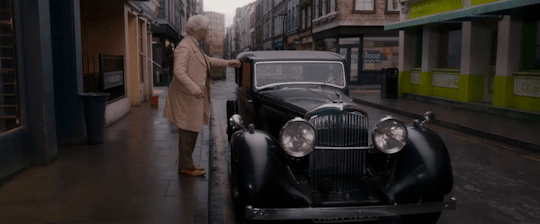
✨This✨
Realistically, Aziraphale should probably be a tad worried about the eery encounter with Shax, in which she definitely had the upper hand on him. But well, if you spend many-a hours driving across the serene countryside (Edinburgh is about an 8-hour drive from London), pondering on one of the craziest, sticky-sweet romantic adventures of your not-life life, well ... things tend to turn a little rosy around the edges. Head in the clouds and all that. Light shades of grey!
Alright, onwards: Once the angel, filled to the very brim with fond memories and butterflies, gets out of the Bentley, he's kindly met with a face full of verdant plants and a very in-character-grumpy Crowley.
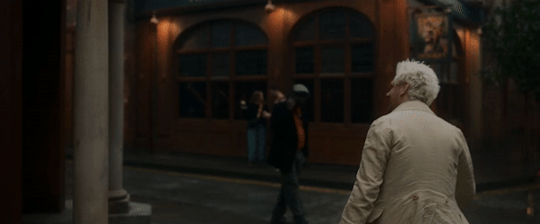
Fhwack! Way to burst the rosy bubble.
Seriously, the absolute lightning speed with which Crowley storms out to vacate the bookshop the very second Aziraphale arrives makes me giggle every time.
Let's make a first small (who am I kidding) diversion into analysing the following conversation in unnecessary detail ...
... simply because I enjoy quoting dialogue as an accurate reference in my metas. I'll also highlight certain passages I want to comment on in individual colours so I can back up my thoughts with them below. Alright, their little chinwag goes as follows:
Crowley: "They you are! I was worried something might have happened to you."
Aziraphale: "No, nothing happened to me. Very uneventful journey indeed. No strange things at all."
Crowley: "Good. That's what we wanna hear."
Aziraphale: "Um .. everything okay with- ah.." *nods to the bookshop*
Crowley: "Oh, yeah, fine. He's singing to himself. I think he must have been asleep. I heard snoring coming from his bedroom–"
Crowley, to the Bentley: "Did you miss me? I bet you did."
Aziraphale: "... I'm sure it did."
Crowley: "So, any more clues from the mystery of the missing archangel?"
Aziraphale: "Not exactly. Or, if there are, I haven't yet cracked the case. But I'm certainly hot on the trail of something."
Crowley: "I'm sure you are. Oh, by the way, the whole sudden rain and awning thing was a complete washout."
Aziraphale: "Sorry?"
Crowley: "You know, project making Nina fall in love with Maggie. I failed, it's your go."
Aziraphale: "I see. Well then, Whickber Street Traders and Shopkeeper's Association Monthly Meeting, here we come!"
Crowley: "You're really hosting the meeting?"
Aziraphale: "Absolutely! And I can guarantee you, it will be a night to remember."
At first glance, this has little to do with the plot of this meta but actually, it folds into my point very nicely! However, it's not time for that yet, so we'll just state the facts as they are for now and then bring them back 'round later when we need them. That being said: For the love of Someone, will these two ever manage to simply tell each other the truth of what happened instead of thinking they can protect each other by lying about it all the time? Hrmpf. As a big fan of open communication myself, I'm close to developing a stomach ulcer with the amount of false truths being spewed here. (Then again – and yes, that is another, way larger meta I'm currently cooking up – it plays so very perfectly into the whole Jane-Austen-Pride-and-Prejudice tragic miscommunication theme that this entire Season has, so I understand the point of it.)
Very uneventful journey indeed, Aziraphale, except for the fact that you were ambushed by a demon who told you she was Crowley's successor, knows about the rumors of the two of you being an item as well as what went down in 1941 (that almost had both of you exposed) and also seems to have figured out where you and your demon boyfriend are hiding Gabriel, all in the span of about a minute. No strange things at all, nooo!
And Crowley's "Oh yeah, fine" is a total lie too. Again, we see him make an absolute run for it before Aziraphale can even enter the bookshop. After all, he just once again witnessed Jim have a Gabriel-flashback, speaking of the Second Coming, while Crowley was alone with him. As fumingly angry he is with the amnesiac archangel – he's also absolutely terrified of what might happen (to him and Aziraphale) should Jim regain his memories. So, no wonder he's quick to vacate the premises after witnessing Jim's rather eery memory flashback (and was, just like Aziraphale, threatened by Shax mere moments later, lol).
But no, nothing out of the ordinary happened to either of them. Tip-top. Absolutely tickety-fucking-boo.
Alright, let's get back on track with the actual topic of this meta. Certainly hot on the trail of something, hm? At first glance, it might seem like Aziraphale is talking about the fact that Gabriel was in company of someone whenever he went to the Resurrectionist Pub. (The clue!) However, I don't actually think he is talking about that. Why? Because, and this slipped my mind too at first, he never actually follows any of this information up, does he? Yes, sure, he went to Edinburgh, found the capital-c Clue and then returned to London. But what does he do with it? Nothing. He doesn't keep investigating this hot trail because that's not the important thing he realized during his journey. No, the more important clue Aziraphale found during his trip, is that Crowley no longer works for Hell and that he is also very much irrevocably in love with him and must confess this at the earliest given chance. (The latter part isn't necessarily a new discovery for Aziraphale, but it surely is fuelled by the fact that he just realized Crowley's out of a Hellish job and simply hasn't told him yet.)
This exchange just the perfect indicator for the fact that Aziraphale, at no point during his drive back, was thinking about the Maggie and Nina mission. He has no idea what Crowley is talking about once he mentions it and seems surprised, even, that he would. Even though they just talked about it on the phone when Aziraphale was still at the graveyard. Which is another important piece of evidence because it means that the last status update Aziraphale got of Mission Lovebirds, was that Crowley had sensed an opportunity to make them fall in love – and had then hung up on him. Why is this important? Because it means that until that very point of their conversation, Aziraphale did not know that Crowley's attempt had failed! There would have been just as much of a chance of Crowley's weather miracle actually working out and Maggie and Nina already having skipped into the sunset happily ever after.
So, riddle me this:
Why would Aziraphale spend the entire ride back from Edinburgh plotting "a night to remember" (because clearly, he already had the entire Ball planned out down to a T in his head since he goes into action right away after arriving) if he didn't even know yet that Crowley's attempt had failed?
To be very clear here: We're not talking about Aziraphale driving on the M1 to London, having a silly little idea for putting on some good music, miracle-ing Nina and Maggie to dance to it and watch them confess their love–
No.
He planned an entire actual Cotillion Ball with very particular location design that involves re-arranging the entire bookshop, specifically designed individual outfits for (almost) every single attendee, topped off with a live band, hors-d'œuvre, drinks and an actual choreographed group dance.
During one car ride.
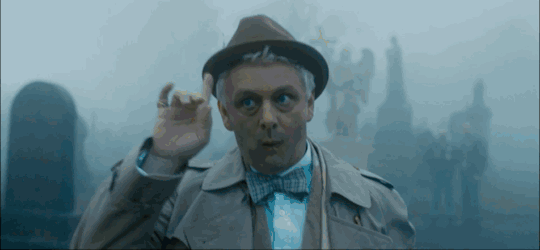
Where's the party planner Aziraphale AU? I'm waiting!
Now, sure, we know that it's still quite important for Aziraphale to convince Heaven of the faux-reason they gave for their accidental ✨25-Lazarii miracle✨. But if we're all honest, this all seems to be a tad much just to make two random humans fall in love, even for that.
Glittery ball gowns and suits? Red and gold wall curtains? A modified language filter? Bloody vol-au-vents?
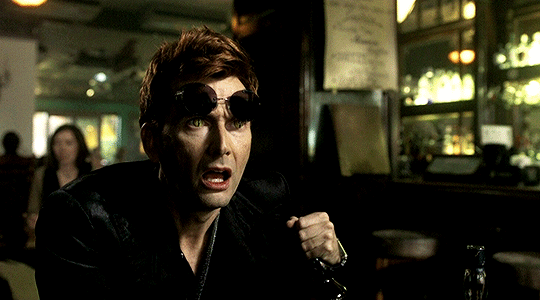
Talk about over the top ...
Once we start S2E5, Crowley is still surprised at the mere fact that Aziraphale is actually planning to organize the Monthly Meeting – and he doesn't even know yet that it's gonna be the most extravagant ball-boogaloo that the Whickber Street Community has ever seen! Aziraphale wanting to organize the meeting alone, is enough to render Crowley incredulous, because Aziraphale never mingles with the other shopkeepers. He usually actively avoids them and any sort of social encounters as much as he can because he doesn't care about the bloody Christmas lights, alright?
These things seem mundane and uninteresting to him, obviously, since all he really cares about is hoarding his book collection in peace like the little hedonist he is and drawing as little attention as possible to his none-business business.
Oh, right, speaking of books:
Let's take another unnecessarily detailed look at the whole Whickber Street invitation scene:
Aziraphale realizes very quickly that he's not the only one who's quite unenthusiastic about the blessed Chritsmas lights. And despite his very persuasive methods of temptation ...
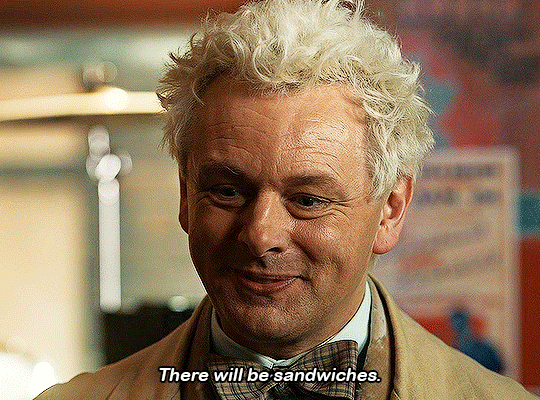
... he has to take some more drastic measurements. And those are?
That's right: Giving away his books.
I'll repeat it again, slowly: Aziraphale is willingly (!) giving away or lending his books to pretty much complete strangers to, allegedly, make two other humans strangers fall in love.
Seriously, who is that angel and what has he done with our prim, fussy, hedonistic Aziraphale that protects his books with the vice grip of an eagle carrying his precious prey?
Believe in the importance of Mission Lovebirds as much as you will, but we're talking about Mr. A.Z. Fell here who, over the past millennia, has pretty much spent every day actively working out methods to stop people from purchasing as much as a single paperback from his holy shelves.
And yet: the 1965 September Dr. Who Annual? Given away. The first edition of Expert at the Card Table that was S. W. Erdnase's personal copy? Lent away to grubby human hands to fondle around with.
Let's do another coloured dialogue diversion (don't worry, it's not as extensive as the last one):
Crowley: "You just did what I think you did?"
Aziraphale: "I'm not prepared to talk about it."
Crowley: "You gave away a book."
Aziraphale: "I had to! Maggie and Nina are depending on me. They just don't know it yet."
Crowley backs up my point: This is a huge deal. Aziraphale does not sell his books – let alone give them away for free. We're all shocked! Flabbergasted!
And the explanation Crowley and us get just ... doesn't satisfy. Something and someone sure is depending on this Ball and doesn't know it yet. But it's most definitely not Maggie and Nina, folks.
You know for whom Aziraphale would give away his books in the blink of an eye, though?
Mhm, that's right.
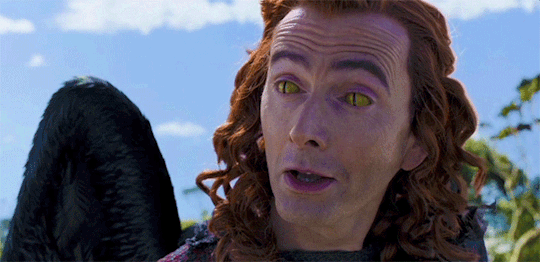
This pretty old serpent.
I want to take a minute to show you the reaction again that Aziraphale has upon entering the very same magic shop him and Crowley went to in 1941 to acquire the Bullet Catch:
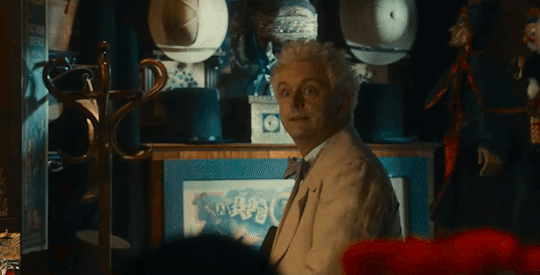
You ... you need a minute there, angel? You're sure looking a little ... affected.
And I mean, well, no wonder. He reminisced about that very memory four hours last night. To him, this shop is where the most turbulent, ecstatic, adrenaline-fuelled and romantic night of his life began. And it shows.
I've made my point in my other meta series about how Aziraphale is an incredibly nostalgic character. He romanticizes so many things in his memories – especially the parts that feature Crowley. So, it doesn't surprise me in the slightest that he's once again willing to loosen the tight grip he has on his book collection to get the successor of Will Goldstone's Magic Shop, the shop that started it all for him, to come to his fancy Ball.
As we watch Aziraphale and his little lap dog demon pat around Soho, I'd like to take another second to point out that he goes to seven or more establishments before he even invites Nina.
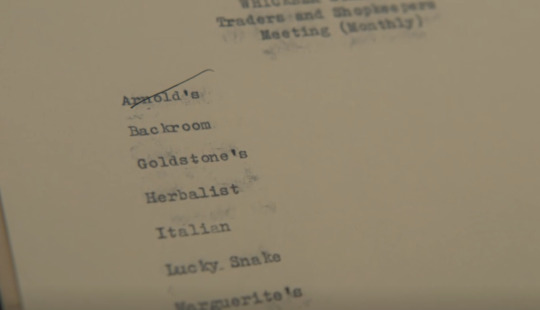
... and he only does so because she starts talking to them on the street. Almost like he'd forgotten about it. Why not ask her at the very beginning? To establish whether or not he'd have to book-blackmail her too?
"Perfectly ordinary invitation with no hidden agenda of any kind", except that he's using you and Maggie as a pretence to resolve his own clusterfuck of a relationship-miscommunication Jane-Austen-style so that he can then hopefully confess his undying love to his demon not-boyfriend boyfriend.
Marvellous!
You'll forgive me another short diversion but my God, the whole exchange at the Marguerite's restaurant with Crowley literally cat-call-whistling Aziraphale over to him (and Aziraphale checking if he meant someone else first, I–)? I am weak. So, so weak and
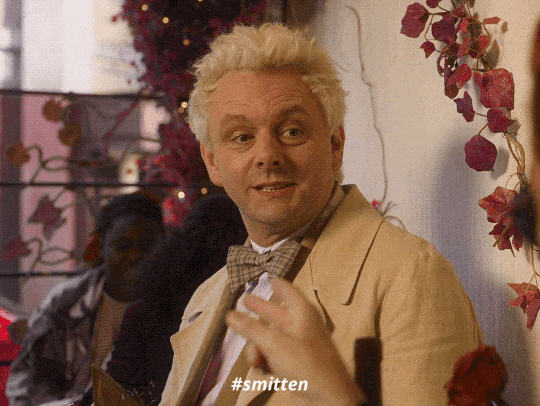
However, this is also when we get a snippet of Crowley finally revealing the truth in place of his "Oh, he's fine"-lie earlier and telling Aziraphale that he's actually pretty scared Jim might turn back into Gabriel and smite him altogether. And Aziraphale's response is, in a cosmic sense, (remember the pink paragraph now) so hilarious:
"Have you thought of just talking to him?"
Yeah, have you? Have any of the two of you? Just thought about talking? To each other? About anything?
'pparently not. But hey, it's all good because remember what the ultimate remedy for star-crossed lovers simply misunderstanding each other is?
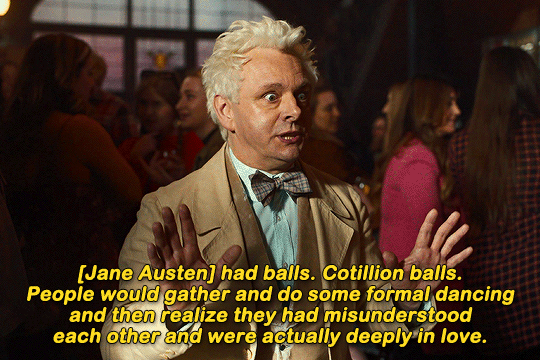
Bish, bash, bosh, problem solved!
Back at the ballroom bookshop, Aziraphale sends Crowley to invite Maggie in order to, in my opinion, not spoil the Ball-y surprise for him. (Inviting Maggie only now?! Wouldn't she be one of the only two guests who really should attend? Why the short notice? If she's really that important for the Ball you're planning, hm?)
On top of this, we see Nina almost not attending the Ball meeting after her partner broke up with her and Crowley being the one who coincidentally runs into her and ushers her into the bookshop before Shax and her "legion" of demons start creeping up on them. Again, if this hadn't happened by pure coincidence, Nina would have left to go home and this whole Ball would have taken place without her, rendering the apparent sole purpose of making her fall in love with Maggie useless.
Why doesn't Aziraphale care more for both of them to attend and be there? Why is he instead busy fussing over everything looking perfect and wonderful and doesn't even seem to notice that both Nina and Maggie are really late to the meeting?
Well. Well.
The answer's in the title, babes.
Alas, Crowley safely gets Maggie and Nina to join them, Mr. Brown is the only one who doesn't get a miracled outfit (fussy, petty angel, you just don't like him, do you?), Jimbriel stuns with glamour and flirt (and whatever sexually suggestive thing he does with his cheeks) and the Whickber Street Ball is a-go!

Sorry, I just had to chuck this in again because Crowley's face here absolutely kills me every time. He looks so confused, I am hollering.
And the heart eyes Aziraphale is making at Nina and Maggie now that they're actually here?
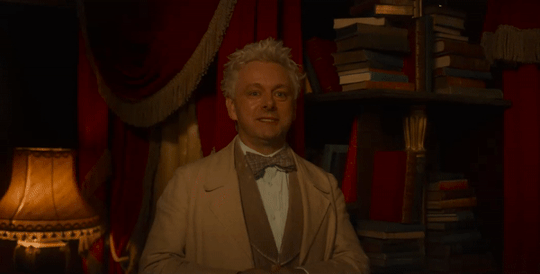
Oh, bless it, angel.
He's all like "Oh look, it's working! Jane was right! It's all going to be resolved, all the misunderstanding and quarrels! Crowley, where's Crowley–"
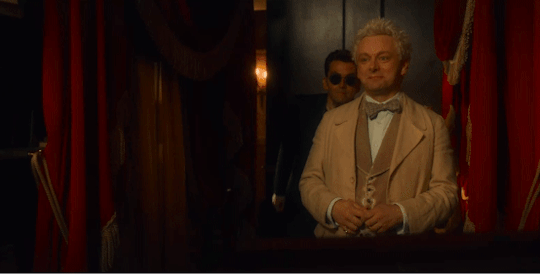
Ah yes, there he is.
Ladies and gentlemen, this is an angel who is not listening to a single word being said right now. No, in his head, Aziraphale is already down on one knee, pouring his heart out to Crowley after they just danced the night away.
Oh, yes, right. The dancing.
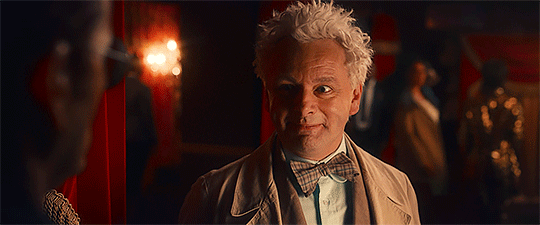
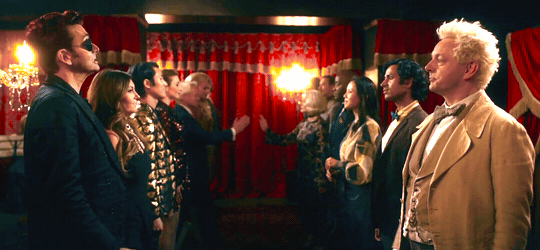

Parallel much?
But well, as marvellous and beautifully romantic as her stories tend to be, it turns out that Jane Austen isn't always right after all. Because before we know it, the perfect night shatters into many-a tiny pieces (literally).
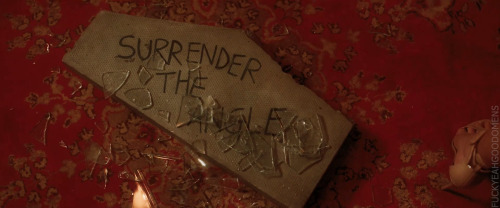
And once again, fhwack:

... the rosy bubble bursts.
Let's take one more deep breath so I can make my final point:
In S2E2, Aziraphale explains to us very exactly what Jane's Balls (hrhr) used to be about: Solving miscommunication and confessing love to one another.
During his car journey back from Edinburgh, Aziraphale:
doesn't know Crowley's Mission Lovebirds had failed
remembers 1941 and just how badly he's in love with Crowley
and also realizes that they seem to have been wildly miscommunicating for quite some time now. (Crowley didn't even tell him he basically got let go!)
So, what does maddeningly strong love plus a want to resolve all the miscommunication equal? That's right: A night to remember! A Ball to change it all! A dance, a vol-au-vent, a confession. And, ideally, a happy ever after. Because:
“It is a truth universally acknowledged, that a single man angel in possession of a good fortune Jane Austen collection, must be in want of a wife demon husband.”
The Ball was never for Nina and Maggie. As a byproduct, maybe, yes. But the whole rest of the glimmer and glamour, the careful, romantic planning and set up of it all, the book-bating the other shopkeepers– that was for Crowley and Crowley only.
And oh, if only it were as easy as in the books.
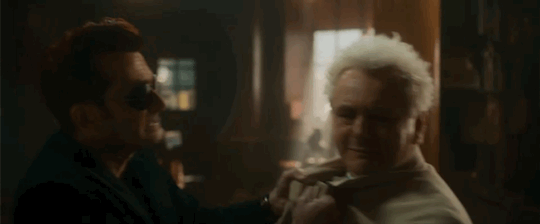
*whispers* I'm sorry, I had to.
***
Your honour, the tinfoil-hat crackpot defence rests. Feel free to share thoughts (and prayers) if you want to!
Au revoir! 💗
#good omens season 2#good omens#gos2#go2#good omens 2#good omens meta#good omens s2#crowley#aziraphale#ineffable husbands#my own meta#the bloody vol-au-vents made me do it#aziraphale has balls#truly#jaune austen ball#it is a truth universally acknowledged that this show is going to drive me out of my mind#azi just wanted his silly little love confession#but then he had to surrender the angle#bummer
563 notes
·
View notes
Text
I know this is NOT a popular take in the RWBY FNDM but y’all…I love Jaune Arc. He’s such a refreshing, interesting male character.
He’s Ruby’s best friend, and the two of them parallel each other in such FASCINATING ways. I’m planning a full video essay on this but as some examples:
1) They both have hero complexes, obviously.
2) Ruby is a prodigy who earns her place at beacon two years early, while Jaune cheated his way in and needs to work constantly outside of his school training to be anywhere near capable of huntsmen level combat
3) Jaune’s pain is loud and disruptive, Ruby’s pain is quiet and suppressed (examining their respective expressions of pain through the lens of gender expectations is REALLY interesting)
4) Ruby inherits silver eyes, an invaluable tool in fighting Grimm. Jaune inherited a regular sword, heavily outclassed by most of his peers.
5) Ruby made her weapon but modeled it after her mentor, Jaune had a hand-me-down
6) Ruby leads by developing plans and taking action, Jaune leads by supporting his team and bolstering their strengths with his own.
I’m sure there’s more too but those parallels are why their conflicts in vol 9 work so well for me, they are partners in narrative from literally the second episode.
I also just adore the commentary on masculinity with Jaune. From day one he was deconstructing traditional ideas of masculinity and patriarchal concepts of heroism.
The way he has to learn to reject so many of the things that blockbusters with men at the center have been pushing for decades is fantastic. He tried to pursue revenge like John Wick or Iron Man and it went HORRIBLY.
He can fight when necessary but it’s not where his true strength lies and that’s SO COOL for a male character.
I dunno y’all I just think he doesn’t deserve the hate. He doesn’t butt in on other stories nearly as much as people claim—in terms of Ruby, he actually serves her story quite a bit—and he is a character worth following in and of himself.
#rwby volume 9#rwbypositivity#RWBY#rwby hiatus#rwby positivity#rwby meta#rwby analysis#jaune arc#masculinity#healthy masculinity#heroism#rwby volume 10#greenlightrwbyvolume10#ruby rose
395 notes
·
View notes
Text
Looking back, there's actually more symbolic foreshadowing for Whiteknight than I initially realised in the dance arc in V2. When Jaune goes to ask Weiss out, intending to follow Phyrha's advice about cutting out the bravado and just being honest about how he feels, he's holding a white flower to give to her:
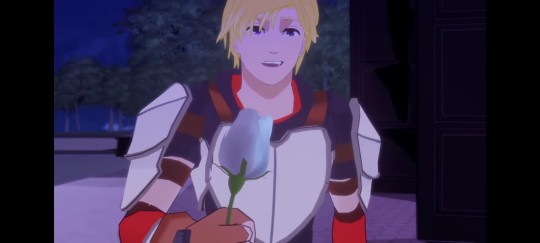
But he then sees Weiss asking out Neptune instead, and realising she has someone else she's interested in, he drops the flower and leaves.
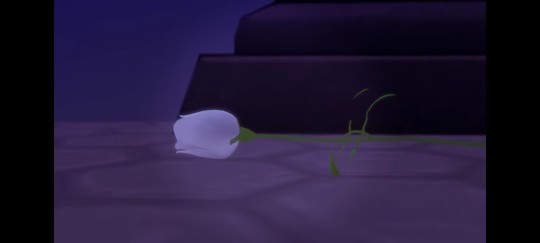
Essentially the flower represents his romantic interest in Weiss, but also a potential future of a relationship between the two based on mutual honesty and respect, (following Pyrrha's advice to just be yourself) instead of the false selves they project and initially see the other to be.
After this scene of dropping the flower he stops with his attempts to ask Weiss out altogether. Him dropping the flower is him dropping his romantic interest in Weiss, instead focusing on just being a good friend and looking out for her (convincing Neptune to go talk to Weiss because he knew it would make her happy).
But we see this flower transition into this vase, drooping and wilting at the dance:

...followed by a frustrated Weiss trying to perk the same flower up:

Which seems to foreshadow Weiss later on being the one to take a romantic interest in Jaune in V9, and also being the one to support and reassure Jaune when he's at his lowest:
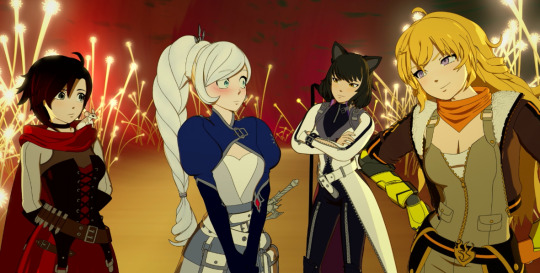

Which does in turn seemingly cause that potential budding flower of their relationship to grow and bloom again, just as the two of them have been growing into their own true selves over the course of the series.

And I just think that's pretty neat.
#suprise! a whiteknight post!#this ship doesn't make me feral or speak to my soul the way other rwby ships do but I think it's pretty well written and set up#and that I can appreciate#rwby#weiss schnee#jaune arc#rwby2#rwby9#whiteknight#rwby meta#kind of?
396 notes
·
View notes
Text
Team RWBY and Jaune can no longer watch film versions of The Girl Who Fell Through The World, because every time the Curious Cat shows up-screen they either shoot, punch, or stab the TV set.
#RWBY#Greenlight Volume 10#Meta#Jaune Arc#Ruby Rose#Yang Xiao Long#Blake Belladonna#Curious Cat#The Girl Who Fell Through the World#The Ever After#Movie adaptation#shoot#stab#punch#the tv#trauma
251 notes
·
View notes
Text
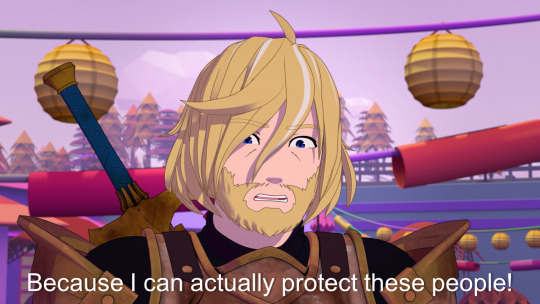
Jaune's story has always been about learning that he isn't the hero. When he came to Beacon, he wanted to be the hero, but learned in volume 3 through Pyrrha what that actually meant.
In volumes 4 and 5, Jaune's desire to be the hero reaches its self-destructive climax, nearly getting him killed. He unlocks his semblance, showing him who he's meant to be. The one who supports his friends.
Volumes 6, 7, and 8 show him growing into that role. The one who supports. He helps push his friends to be the best they can, to go further, to go faster. He keeps them alive.

Until he doesn't.
Suddenly, Jaune's forced to question everything. All his growth, everything that happened. Was it his fault? If he had been the hero, would he have been able to save Penny?
There's no one around to tell him otherwise.
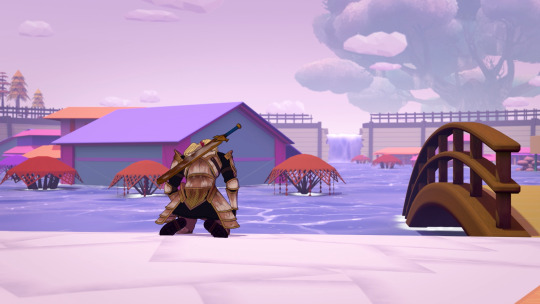
But... he still isn't the hero.
He has to learn to let go. To change. To not be able to save everyone. It might be hard for him, but he has to learn to not be the hero again. Even if that means he won't be able to protect everyone he loves. Because otherwise...

He'll just end up pushing away the people he loves.
609 notes
·
View notes
Text
Hot take: Ozpin isn't even morally gray. I guess he is if you count past lives (slaughtering potentially thousands of ppl to end a war), but otherwise?? I really don't think he is.
Imo, Qrow is more morally gray, Ironwood pre-villain arc was morally gray, etc. I really don't think any of Oz's actions could count as 'morally gray', even when considering that he kept important information to keep his circle and by extension RWBY and Co hopeful, regardless of if you think it's manipulative or not (technically yes, but there was good intentions behind it so imo it's fundamentally different).
Oz really isn't the bad guy the entire fndm tries making him out to be. If he was I think the show would show him in that light, which it doesn't. It TRIED showing him as morally gray, but generally his actions aren't that bad. The FNDM loves saying Oz is an awful manipulative compulsive liar who's intentions are weird and muddy. But honestly I think if he was like that, he wouldn't be portrayed as good. Most of Salems own opinions on Oz is her projecting and being a hypocrite. I don't think the characters narration is reliable when it comes to Oz. The show itself tried making him seem like that in v6, but ultimately failed.
An example people use to say he's morally gray is pointing out that he made the Academies. Which, I won't lie, is a pretty stupid take. The Academies train older teenagers (17-21, possibly older if they allow older ppl to join) who have already been learning how to fight presumably since they were young. Ruby had presumably already had Crescent Rose for a few years by the time she was 15, and there's several combat schools to teach kids how to fight. Remnantians count as a warrior race! They HAVE to fight to survive. Even if you haven't been to an academy, it's normal to know how to fight to defend against Grimm. Controlled by Salem or not, Grimm are a constant that you NEED to fight against. The Academies just give widespread access to tools and education to learn in a safe environment filled with other hunters. They just so happen to fight off Salems Grimm forces, and unknowingly defend the Relics inside. It's a win-win-win on everyone's side. Yes, people are going to die. But they'd be MORE likely to die if a) they can't defend themselves properly b) don't have proper tools to do so or c) don't know how to fight at ALL. Thanks to the Academies, militaries don't need to be used (except Atlas). The possibility of war goes WAY down, and it's harder for the kingdoms to be actively corrupt (not impossible just less easier to be enforced). Objectively? The Academies are a GOOD thing.
Another example is people saying Oz brought RWBY and Co unwillingly into the shadow war. Which... is objectively incorrect. Qrow was the one who told Ruby about the information Cinder and Co were going to attack Haven, and Yang eventually went after her after she left. Ruby brought RNJR with her, because they all experienced trauma and reasonably wanted justice, thinking it was just Cinder behind everything. Then Qrow was the one who told RNJR roughly the truth. He didn't particularly want to, bit he relented anyways, and even then he held back information like Oz being immortal. He didn't even tell them about Salem, just that some nasty people wanted the Relics and Maiden powers and that one of them was named Salem. I guess you could count Ruby being brought into Beacon early, but even then that was the SAFEST option. If Cinder or Roman noticed her silver eyes in ep 1 and that got back to Salem, Ruby would be FUCKED. She was already involved in fighting Roman at that point, and thus would likely get targeted again, silver eyes or not. So Oz brought her in, citing her skill as the reason, while the others likely knew the truth. Qrow OR tai wouldn't have been fine with it if Oz only brought her in to put her into the circle. They would've torn him a new one. Not only that, but obviously he DIDN'T KNOW about the upcoming fall of Beacon. He genuinely thought Ruby and her team was going to be fine for the next 4 years, and when he was starting to suspect something was up, he STILL had no idea the Academy was going to be attacked during the festival. Why would he?? A direct attack isn't typical of Salem, iirc he or someone else said it themselves, especially since it had been 80 or so years since the Great War, which is implied that Salem started. Even IF he wanted to bring her in, he would've waited until after she graduated, which is what happened with STRQ and was going to happen with CVFY. Oz places an emphasis on letting them be kids for as long as possible. He only had to involve them when Qrow already told them everything. And even then, Oz repeatedly gave RWBY and JNR an out. He DID NOT WANT them involved, not yet at least. And with Pyrrha, he didn't exactly have a choice. He gave her time they didn't have, and required her to wait n think, and then needed her verbal consent WHILE BEACON WAS BEING ATTACKED. Yes telling her stressed her out, but I think if she knew the same thing could be offered to anyone else, she'd prefer to take on that burden. It wasn't fair, but it visibly pained Oz to have to give her the choice. He didn't want to, but war is never fair. He would've had to go to SOMEONE regardless.
As for Oz keeping the truth that Salem can't be killed a secret, imo, that is a very VERY hard call for anyone to make. For him it was the option of: tell them immediately and not have any allies (something he values heavily) or have them join Salem out of fear, wait first and tell them later and have them possibly freak out like Ironwood/betray him/lose hope and thus not have any allies, or never tell them so he has important allies and they possibly don't betray him or lose hope. Obviously, he chose the last option, and it's entirely possible he wanted to, eventually, tell them the truth, but we just don't know that. Of course I agree that Oz should've told his circle anyways, but for someone as traumatized and paranoid as Oz who's had to make this decision countless times, you can't exactly fault him for keeping the truth hidden. He's likely told the entire truth before and it bit him in the ass several times before he finally decided to keep it hidden. He said it himself, Leo was NOT the first nor was the last to betray him. As for not telling RWBY and Co? They're CHILDREN he's barely known for, what, a year?? And all of that he was their teacher/Headmaster who didn't often interact with them, or their mentor. He barely knew them and as far as we know, didn't get the chance to actually know and get close to them. They already knew just how dangerous Salem was from the fall of Beacon and battle of haven, plus the fact that she controls Grimm. They could've easily assumed Salem was hard to kill at LEAST since she's immortal and been around for countless thousands of years, and there's no way they thought no one tried to kill her. Oz barely knew them and they almost proved him right by nearly giving up. Plus, he was FRESHLY betrayed at that point. I'm sure yall noticed he was immediately pretty closed off due to the revelation of Leo's betrayal. He genuinely considered Leo a friend, so Oz's trauma response is to hold everyone else at arms length.
Another thing is the fact that he hid the truth from Salem as well early on in their relationship. Thing is, Jinn (a presumably reliable narrator) stated that they BOTH hid things from the other. Salem likely didn't tell him that she lied and manipulated kingdoms into turning against the gods, just that she wanted him back and the gods didn't like that bc that ABSOLUTELY would've upset Oz. Oz, knowing Salem didn't like the gods from her story, likely decided right then to keep the full truth from her, worried she wouldn't react well to it, something anyone would do. Not only that, but right after, Salem convinced, possibly manipulated, Oz into acting as a god-king with her, something he clearly didn't want to do. Jinn herself said "the hearts of men are easily swayed" as Salem convinced him to become a God-king with her. So yes, it's very possible that Salem manipulated him into doing that. "But Salem was fine with the truth later when he told her!" Yes, she was, but Oz couldn't have known that. And the whole reason he tried to leave her was because Salem was turning into a dictator tyrant, something Oz didn't want and something Salem was set on. He did overreact a little bit by bringing the kids instead of communicating with her, but it wasn't his fault that Salem immediately attacked him instead of trying to talk to him, or at least waiting until the kids were in a safe place before attacking him. Most of this wasn't Oz's fault, if any of it. Salem overreacted heavily by attacking him with the kids being react there. Had Oz and the kids lived and escaped her, they would've been TERRIFIED of Salem afterwards, traumatized by the ordeal. And it's never shown that Salem actually cared that they died, just that they "could've had freedom", blaming Oz instead. Meanwhile Oz, afterwards, spent whole LIVES drowning his sorrow and regret and trauma in alcohol, and he's clearly STILL affected by it if Salem using the silhouettes of their children is any indication, since she was likely taunting him (but also reminiscing, regardless of her feelings on the matter) and never brought up their children in any matter.
Overall I really don't think Oz is as bad as the fandom says he is. People like to think he and Salem are the same (something i might make a post on later), when they're very, very different. Oz really isn't bad, he's just traumatized and is basing current events off of past experiences. He's far from manipulative, uncaring, or really any negative adjective I've seen people describe him as. I've probably missed some things, but my point has been made I think. The fndm really likes to misinterpret Oz's character, saying he's exactly like Dumbledore, but in reality he's a subversion of characters like Dumbledore. He's a seriously good guy, and I think people miss that.
#felix (host)#rwby#professor ozpin#ozpin#ruby rose#yang xiao long#blake belladonna#weiss schnee#jaune arc#lie ren#nora valkyrie#pyrrha nikos#qrow branwen#james ironwood#crtq#rwby fndm#meta analysis#i think?#team jnpr#team rwby#rwby salem#oscar pine
100 notes
·
View notes
Text
HEY I KNOW THAT WE'RE ALL EXCITED ABOUT JAUNE, BUT CAN WE TALK ABOUT WHAT RUBY SAW? WHAT SHE DID?
"People are never truly gone" THEN SEEING SUMMER IN THE HALBERD THING!?!?
HAVING TO GIVE UP THE BURDEN TO TAKE A WEAPON (ONLY ONE)
AND THEN GIVING UP "A Mother's Promise"
HER MOTHER WHO IS THE MAIN REASON SHE BECAME A HUNTRESS IN THE FIRST PLACE!@?!?
...
Is ruby giving herself up, piece by piece, in order to save her friends (and sister), just like she was doing on Remnant? She gave up her innocence, her childhood when she accepted getting into Beacon early.
How much more does she have to give before she's not Ruby Rose at all?
Because it seems to me that even in the Ever After people are more than their roles to some degree, even when it tries to break them down into a new one.
And if Ruby's purpose is to achieve victory against Salem.
And if victory is in a simple, more honest soul?
How much of a person must be rendered away to get that?
#rwby#jaune arc#ruby rose#yang xiao long#weiss schnee#blake belladonna#rwby volume 9#rwby spoilers#rwby meta#rwby volume 9 spoilers#summer rose
444 notes
·
View notes
Text
RWBY's Alyx In The Ever After
Here comes a meta on the Alice's inspiration of volume 9! The whole season is packed with allusions to Carrol's two works: Alice's Adventures in Wonderland and Alice Through The Looking Glass. I will try to focus on the references most important for our girls' journey and on how Alice's story is used to convey a central theme of the volume: growing up.
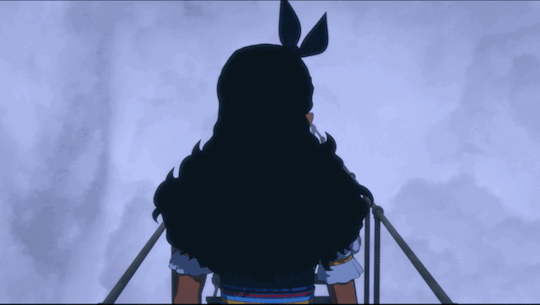
TWO WORLDS, ONE ALICE AND THE SAME STORY
Carrol wrote two books about Alice's adventures.
Alice's Adventures in Wonderland tells the story of how Alice falls down the rabbit hole and discovers a magical world. Here are some highlights and key elements (skip them if you already know the story).
Alice sees a white rabbit who keeps repeating they are late. She follows them into a deep hole and arrives in a strange room. There she finds drinks and cakes, which make her big and small. She tries to use them to grow the right size to enter a beautiful garden full of red roses. Still, she messes up, starts crying and almost drawns in her own tears. She survives together with a mouse, a dodo and other animals. The mouse starts telling her a story, but gets offended and scared when Alice mentions her kitty Dinah.
Alice meets the White Rabbit, who confuses her for their housemaid. Alice goes to the White Rabbit's house, but drinks a potion and becomes a giant. She eats some tarts, shrinks and runs into a forest. There she meets a Caterpillar, who gives her a magical mushroom to manage her size. Now in control of how big and small she is, she keeps exploring the world. She interacts with a Duchess, her pig child and her Cheshire Cat. The Cat gives Alice directions to reach the March Hare's House.
Alice arrives at the Hare's house and meets the Hare, the Hatter and the Dormouse, while they are having tea. She joins the party and discusses with them until she gets fed up and leaves. By this point, she sees a small door in a tree, opens it and finally arrives in the garden of red roses. The garden is the Queen of Hearts’ Kindgom and Alice gets invited to play croquet. Alice does her best, but is annoyed by the Queen's cheating. After some other adventures, Alice is forced to take part in a theft trial. The whole thing is a farce and eventually Alice gets angry with the Queen and the other Wonderland people. She grows big, shouts they are all just a pack of cards and destroys the Queen's Castle. She wakes up and tells her sister about the dream.
Alice Through The Looking Glass is about Alice's journey in the Looking Glass dimension, where a chess game takes place. Here is a quick summary (again, skip it if you know the story):
Alice enters a mirror and finds herself in a magical world. First of all, she discovers some living chess pieces and tries to move them around. Then, she tries to read a short poem called the Jabberwocky, but she can't understand it. Finally, she goes outside and talks with the flowers of the garden. They tell her about a flower that wears a crown and Alice soon meets the Red Queen. They have a conversation and Alice discovers the world is a giant chessboard and accepts to play the game as the white pawn. Her objective is to cross the chessboard, so she can become queen (as per the rules of chess). She goes through a square by train. Then she suddenly finds herself in a forest where she forgets who she is. Once out, she meets Tweedledum and Tweedledee, who fight each other. They point Alice towards the Red King who is sleeping and dreaming the whole world.
Later on, Alice meets the White Queen and talks with her. Then she reaches a strange shop and has a boat trip together with a goat. She finds herself in the shop once again and moves towards an egg, which turns into Humpty Dumpty. They chat about the Jabberwocky and the meaning of words, but eventually Humpty Dumpty falls. All the White King's men arrive to try and put him back together, so Alice meets the King and his two messangers (who are the Hatter and the Hare). Together with them she looks at the Lion and the Unicorn's fight.
At this point, Alice is caught by the Red Knight, but the White Knight comes and saves her. The two of them travel together and the Knight sings the Aged aged man song. He helps Alice reach the final square, where she is crowned Queen. A banquet is organized to celebrate Queen Alice, but there is a commotion. Alice loses her temper and reproaches the Red Queen by shaking her. The Queen turns into a small black cat and Alice wakes up in her house with her two kitties. She is left wondering if she is the one who dreamt it all or if the Red King did.
The two worlds get often mixed up in adaptations and Alice's adventures are reduced to a single journey. This happens because the two books tell the same story. They metaphorically show Alice's growth.
In Wonderland, Alice's different sizes represent confusion over who she is, which is normal for children growing up. This insecurity is why Alice initially can't grow the right size to enter the garden. Still, she succeeds by the end and eventually grows big (grows up) in the climax.
In Through the Looking Glass, Alice starts as a pawn, goes through a journey and finally gets crowned queen. This motif conveys her inner growth.
In other words, Alice's story is a coming of age journey. She starts as a child and symbolically develops into a more mature version of herself.
The Girl Who Fell Through the World is the same. Alyx is a selfish kid, who becomes a different person by the end:
A door opened for Alyx at the Tree. Before she goes back home, the girl had a great many questions to ponder. After all the lessons she learned, and the friends she'd made and lost. Who had she become? Would she still be the same Alyx when she went back home? The leaves of the tree rustled, and on the wind, Alyx heard one more question… What… are you?
"What are you?" is the central question of Lewis's fairy tale. Let's try to better understand it by exploring the setting (the Ever After), the protagonist (Alyx) and their connections with Carrol's works.
THE EVER AFTER (THE WORLD)
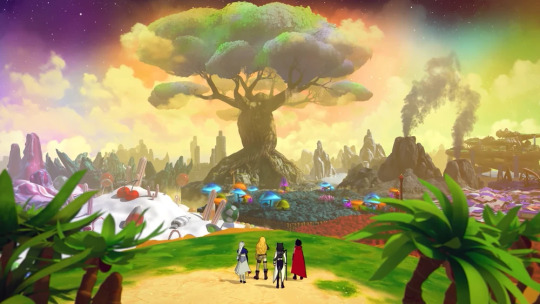
The Ever After alludes to Wonderland / the Glass World. Here are some examples:
It's made up by acres, like the Glass World is made of squares
People shrink like in Wonderland
Time and space work funnily, like in the Glass World
It has talking animals, like Carrol's stories
It has several characters from Alice's books, like the Jabberwalker (Jabberwocky), the Curious Cat (Cheshire Cat), the Herbalist (Caterpillar), the Red Prince (Red Queen) and the looking glass insects
Its inhabitants use words in peculiar ways, just like the characters in Alice's worlds
It's a dimension full of nursery rhymes and sayings that become real things. For example, the Ever After takes the meaning of metereopatic and inverts it. Here, people's moods are not affected by the weather, but the weather gets influenced by emotions
The name "Ever After" itself comes from two sayings:
Happily Ever After is the ending of most fairy tales. It describes perfect happiness that lasts forever, which is an idea rooted in childhood
Hereafter references the life after death. It ties this dimension with death and grief and makes it a realm of the deads
So, the Ever After combines together the themes of childhood and death. The end result is a world built on the concept of ascension:
Curious Cat: When we break or wear out or simply finish what we were made to do, we’re called back. But Herb… his heart was too weak to listen, so I gave him a little bit of mine. Now that Herb’s properly returned, he’ll be fixed up nice, and made into the Herb he wanted to be when he was still “Herb”. Then he’ll come back and find his purpose. Could be the same as before, or maybe not. I know, I know, where you're from, things… die… but we’re just not like you at all. We… ascend. Herb will have a purpose again.
Afterans don't die, but ascend. They get to live "ever after". Just like in an imaginary world thought up by children. And in a sense, that's exactly what the Ever After is:
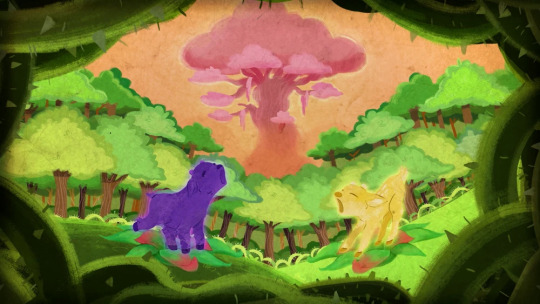
It is a proto-dimension, where the brothers play and experiment, as children do. The moment they introduce the Jabberwalker (death) things change, the balance is broken and the Brothers must grow up and find a new equilibrium. This is something that happens to everyone. Growing up means to deal with death and to accept it. It is the only way to embrace life fully. The Ever After is a place that helps the characters do exactly this, which makes it the Underworld of RWBY in three different ways:
It is the world under Remnant. The world that comes before. This is why the characters fall into it. It is a place linked to the past of the universe (the Brothers) and to the past of the characters (a childhood book).
It is the world of the deads, where the characters deal with loss by going through the five stages of grief. In this sense, their fall is a metaphorical death.
It is the world which exists under many piled up emotions. It is where people get in touch with their interiority by falling within themselves:
Inside
A new me, I'm ready
But who will I find?
So, childhood, death and interiority. These are the three ingredients of this setting. Let's see how they get mixed up in the story of the girl who fell through the world.
ALYX (THE PROTAGONIST)
Alyx alludes to two Carrol's characters, as her design implies:
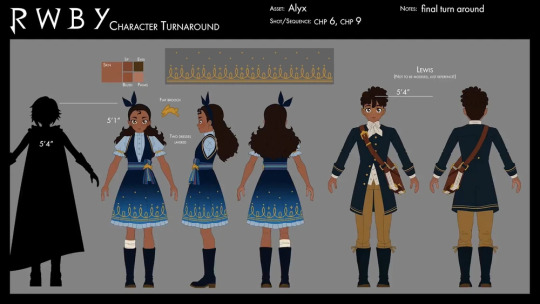
She is modeled after Alice herself. She wears a blue dress and a bow like her Disney counterpart
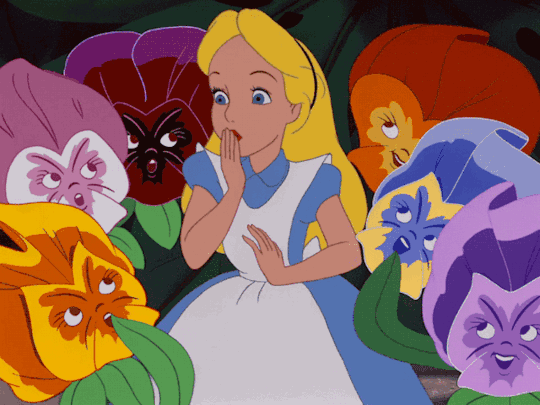
She has several details linking her to the White Rabbit. For example, her bow resembles small rabbit ears and she has a gold rabbit-shaped brooch
This isn't surprising because Alice and the White Rabbit are written as foils in the original book. According to Carrol:
"And the White Rabbit, what of him? Was he framed on the "Alice" lines, or meant as a contrast? As a contrast, distinctly. For her 'youth', 'audacity', 'vigour', and 'swift directness of purpose' read 'elderly', 'timid', 'feeble' and 'nervously shilly-shallying', and you will get something of what I meant him to be."
RWBY takes this idea and combines Alice and the Rabbit in one character. The result is an ambiguous young girl:
Oscar: I thought the idea of falling through Remnant into a new world was exciting. I never understood why she was so sad when she finally made it back home. But now it makes more sense. She wasn't the same girl anymore.
Ozpin: I was recently reminded of an old fairy tale. A young girl flees the consequences of a choice, to a magical place. But, having never learned from her initial failure, she only succeeds in spreading it.
Yang: But she was kind of a mean person, right? She lied and cheated her way through most of the book.
Weiss: She was trying to survive. The morals of those old stories are so simplistic.
Alyx is described as a lost child, a corward, a mean person and a survivalist. Everybody interprets her differently. This is true also for the two people who know her personally.
Jaune turns Alyx into a villain, who sacrifices her brother and lies to everybody:
Jaune: I think… Alyx traded him to the tree, in order to leave. And then she wrote him out of the story.
Lewis tones down Alyx's negative traits and makes her the heroine of his book:
Blacksmith: Yes. Only Lewis returned home. The Girl Who Fell Through the World is the story as he wished it happened.
A monster and a hero. Everybody makes Alyx black or white, while she is gray, like her small knife:
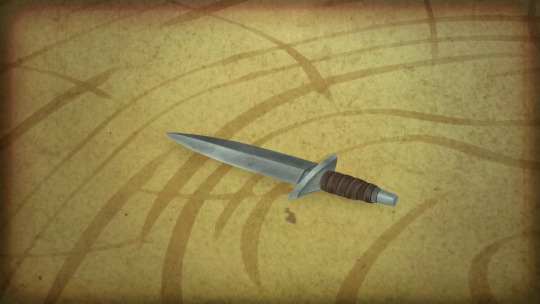
Weiss: What did Jinxy want from Alyx (for her knife)?
Blake: Her saddest memory… and her happiest.
She is gray because she is a real person. Still, she gets reduced to a character. This duplicity is at the root of her two allusions:
-Alyx plays the White Rabbit (a character) in RWBY's story in volume 9. The girls try to re-live her journey, so that they can escape. As they make progress, though, they discover Alyx doesn't meet their expectations. They take detours and find their own path.
Similarly, Alice quickly loses interest in the White Rabbit, after she meets him. She switches goals mid-journey, from the White Rabbit's house to the garden of roses.
-Alyx is Alice (a person) in her own story, which gets turned into a fairy-tale by Lewis. The Girl Who Fell Through the World even comes from a line in Carrol's Alice's Adventures in Wonderland:
Presently she began again. `I wonder if I shall fall right through the earth! How funny it'll seem to come out among the people that walk with their heads downward!
So, Alyx is both an extra (a character) and a protagonist (a person). At the same time, she is the mix of Alice and the White Rabbit in another sense. On the one hand Alice is a young girl who grows up. On the other hand the White Rabbit is "always late". So, Alyx is a child, who matures, but does so too late:
NeoCat: Decided she wanted to fix everything that she had broken in the Ever After! Including poor Jaune! So Lewis went, and in the very last moment… Alyx didn’t…
She mistreats the Afterans throughout her journey and has a heel-realization only in the end. By then, though, the Curious Cat is already broken by her lie and kills her. Still, Alyx does grow up and makes a final choice, who defines what she is:
Blacksmith: When Alyx’s life ended, she chose to leave a part of herself behind. A wish to fix what she had broken.
She truly turns into the heroine Lewis portrays her as. Sure, Alyx never gets the chance to become an adult and to live a long life, but she still grows into herself.
In conclusion, Alyx's story ties together the themes of childhood and death, as it is both a fairy tale and a tragedy. Still, hers is only the first adventure set in RWBY's Wonderland. The second is the one of our protagonists'. How do they fare in this strange dimension?
THE SAME WORLD, NEW PROTAGONISTS AND A SEQUEL
Weiss: Great! So we’re not in the stupid story after all. We’re in its stupid sequel!
RWBY find themselves in Alyx's world and start a journey similar to hers. However, they soon realize they can't leave the Ever After by following into Alyx's footsteps. In other words, RWBY start by thinking they already possess the interpretative key to solve the Ever After:
Blake: In the story, Alyx fell from the sky and met with the Hunter Mice, got trapped in vines, fought a Jabberwalker, and got her knife stolen by… A talking raccoon.
Yang: Yeah. And then she beat the Red King at a board game, met the Curious Cat, the Rusted Knight, and finally got out through…
Blake: The tree
They follow the Girl Who Fell Through the World, but things go bad and it is only when they start living their own story that they are able to go back to Remnant.
This resembles Alice's adventures, which take place in games. The first book uses cards, while the second is inspired by chess. However, both stories end with Alice refusing the rules. She escapes both dreams by stopping to play. She destroys the card castle in Wonderland and ends the pompous party in Through The Looking Glass. Both books have Alice think with her own head, instead of following someone else's laws.
Alice's two endings tie with the books being an exploration and critique of Victorian society. The strange worlds the girl visits are society seen through the eyes of a child. The end result is a place full of madmen because adults' rules and laws make no sense to kids. Alice is asked to conform to a morality, which is pompous and superficial, but she chooses not to and grows in her own person.
RWBY focuses on the opposite idea. The protagonists aren't children lost in the confusing world of adults, but grown-ups, who find themselves in the universe of their childhood. As a result, they are asked to face their inner children, say goodbye to them, but without betraying their ideals and dreams. They must grow-up to be the heroes they dreamt of as kids. Still, in order to do so they must leave behind a childish vision of the world.
Finally, RWBY's adventure is framed as a sequel to Alyx's, just like Through The Looking Glass is a sequel to Wonderland.
The two Alice's stories are written as mirrors of each other:
Wonderland happens in Summer, while Through the Looking Glass is set in Winter
Wonderland makes use of Alice changing sizes to move the plot. Through the Looking Glass instead has the world act strangely around Alice, with time and space twisting
Wonderland is a game of cards, while Through the Looking Glass is a match of chess
Similarly, RWBY's journey mirrors Alyx's:
Alyx's story is one of broken things that ends in death
RWBY's story is one of healing that ends with a rebirth
In particular, Alyx, just like Alice, becomes friends with a cat, but hurts them and has them change for the worst:
Blacksmith: One act of dishonesty… caused an unfortunate change…
Ruby instead, differently from Alice, grows fond of a mouse and inspires them to become a hero:
Blacksmith: One small kindness in one small moment would be such a marvelous transformation.
A LITTLE SILVER LINING
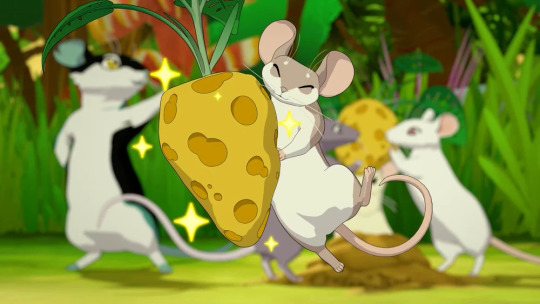
Little alludes to:
Alice Liddle, the real life counterpart of Carrol's Alice
The Little of Little Red Riding Hood, which is fitting as Ruby carries the mouse in her hood
Stuart Little, a mouse, who is born in/gets adopted by a human family
The dormouse and the mouse of Alice's Adventures in Wonderland
Little alludes to Alice because Ruby herself plays Alice in volume 9. The small mouse simply highlights this role with their presence. As a matter of fact you can read Ruby and Little's foiling as an inversion of Alice and the White Rabbit's:
Alice is a brave and strong-willed child, while the White Rabbit is old and acts cowardly. Moreover, Alice starts her journey by following the rabbit.
Ruby is a teenager hero, who appears big and mature to small and child-like Little. As a result, the mouse leaves everything behind and follows Ruby around.
In other words, Little is Ruby's child-self and is characterized as our protagonist at the beginning of the series. This is why they are the Little of Ruby's Little Red Riding Hood. They embody the small child who sets up to explore the world and help others.
In particular, Little stays true to his Stuart Little movie-counterpart:
A Little always finds a silver lining
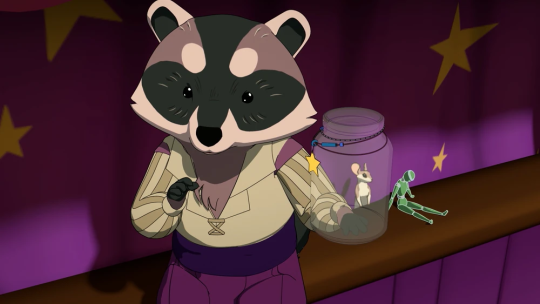
Jinxy: Bidding starts at… Enough hope to fill this jar!
Little becomes Ruby's silver lining, as they are the one giving our girl hope throughout her journey in the Ever After. In a sense, they symbolyze Ruby's wide-eyed idealism, which is what activates her silver eyes.
What about Little's Wonderland allusions?
Just like the Dormouse, they often fall asleep, whereas their first meeting with Ruby resembles Alice's interaction with the mouse:
Alice almost drawns in her own tears and survives together with the mouse, a dodo (Carrol's self-insert) and other animals. Alice chats with the mouse, but she upsets them after mentioning her cat Dinah.
Ruby starts crying and makes it rain. Then, she meets Little, helps them and cheers up. However, she gets startled when the mouse starts talking and she unwillingly scares them by mentioning Blake's cat ears. A dodo is also present at the scene.
Ruby and Little's meeting is also loosely similar to Alice's conversation with the live-flowers. There Alice is surprised the flowers can talk, asks them if they have seen other people and has trouble reaching her destination because she moves toward it, instead than in the opposite direction (as per looking-glass logic). Finally, the flowers mention the Red Queen.
Ruby is shocked Little talks, asks them about her friends and can't reach the tree because she lacks acceptance. Finally, the Hunter Mice foreshadow that cats should not be trusted:
Mouse Leader: You have our sincerest apologies! Please understand that our kind is a bit skeptical of cats… and snakes… and cats.
In general, Little and the Hunter Mice are reflections of Ruby and RWBY. Little is a child who dreams of becoming a Hunter, like Ruby. The Mice prey on big and scary monsters, like RWBY fight Grimms. So, these characters set up our heroines' journey through the Ever After. A challenge to redefine who they are and what being Huntresses means. Let's now focus on this adventure and on the strange creatures RWBY meet in their personal version of Wonderland.
THE RED PRINCE HAS A GREAT FALL
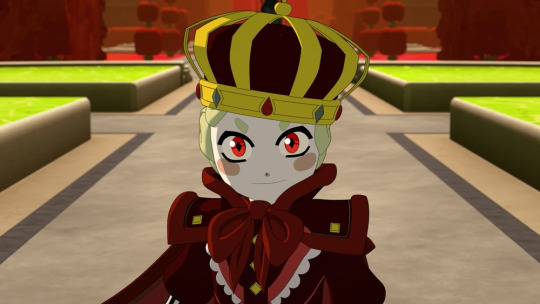
The Red Prince alludes to:
The Queen of Hearts, as he is pompous, a cheater and executes his soldiers
The Red Queen, as he meets RWBY at the beginning and challenges them to a game of chess
Humpty Dumpty, as he cracks like an egg, after realizing RWBY are humans
'They gave it me,' Humpty Dumpty continued thoughtfully as he crossed one knee over the other and clasped his hands round it, 'they gave it me — for an un-birthday present.'
'What is an un-birthday present?'
'A present given when it isn't your birthday, of course.'
Humpty Dumpty comes up with the idea of un-birthday and RWBY goes to the Red Prince's birthday party, which celebrates the King's rebirth as a Prince:
Curious Cat: Oh, it was all very sad. The Red King couldn’t cope when he lost to Alyx, a crying mess. Thankfully, he was called back and fixed up, and now he’s the Prince you met.
The Prince represents a psychological regression, an un-growth, which adds an ironic spin to his "royal birthday". Not only that, but Alyx is the one responsible for this transformation:
Blake: So, that’s why he cheats, when the Red King didn’t. But that still doesn’t explain why the Red Prince was so much meaner.
Curious Cat: While the Prince may not remember Alyx’s deception after ascending, the heart very rarely forgets.
In Wonderland, the Queen of Hearts cheats in her game of croquet, while in the Ever After Alyx plays dirty to win. In other words:
The Red Prince behaves like the Queen of Hearts because he is imitating Alyx, the player who defeated him
The Red Prince (from king to prince) is the opposite of growth (from pawn to queen)
The Prince is a character who suffers a loss and isn't able to overcome it:
'Humpty Dumpty sat on a wall:
Humpty Dumpty had a great fall.
All the King's horses and all the King's men
Couldn't put Humpty Dumpty in his place again.'
None of his horses nor men are able to put the Red King in his place again, which is why he ascends and becomes a Prince. He chooses to run away from his failure and escapes into childhood.
RWBY find themselves in a similar situation:
Weiss: We hatched a crazy plan that put a whole kingdom at risk, and we don't even know if we saved the Relics from… Maybe… Jaune and Winter were able to get them out, despite… everything… despite us…
They suffered a great fall. Will they be able to put themselves back together again? This is the question the Prince embodies, which is why Ruby's match against him mirrors RWBY's journey up until volume 8:
Ruby leads an army of hopeless soldiers, but inspires them to fight
Everything seems to be going well and they conquer more and more space on the chessboard
Still, something unexpected happens and RWBY is targeted by both friends and foes
The girls manage to put up a wonderful fight... only to fall down the table
Isn't it similar to RWBY's experiences in Atlas, where they are let down by Ironwood, have their plan ruined and finally fall because of Cinder?
The Red Prince's game is a metaphor of RWBY's past, which is an inversion of Alice's initial game of chess:
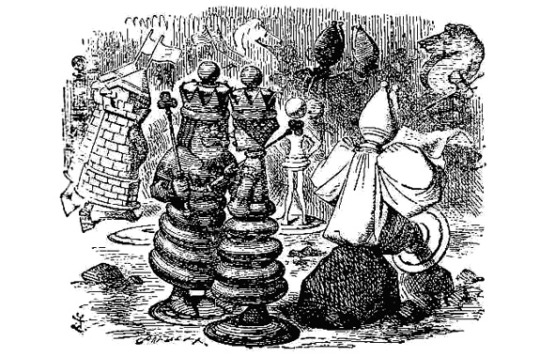
In Through the Looking Glass, Alice sees the chessboard and the pieces she will later on cross and meet throughout her journey. She has an anticipation of the game she is about to play.
In the Ever After, Ruby re-lives her biggest defeat. She plays again a match she has already lost:
Ruby: I don't know how that went so...wrong.
She feels she let Atlas's people and her friends down, so Weiss, Blake and Yang almost die in a fall. Speaking of WBY, their shrinking means two things:
They are turned into pieces Ruby moves around because our leader feels she has to carry her team on her shoulders.
They become small because Weiss, Blake and Yang have all faced their smallest and weakest parts, so they could grow. Ruby instead doesn't change because she has been stagnating.
ADVICE FROM AN HERBALIST - GROWING UP
After the game with the Red Prince, RWBY's priority is to bring WBY to their original size. In their quest, the girls meet the Herbalist:
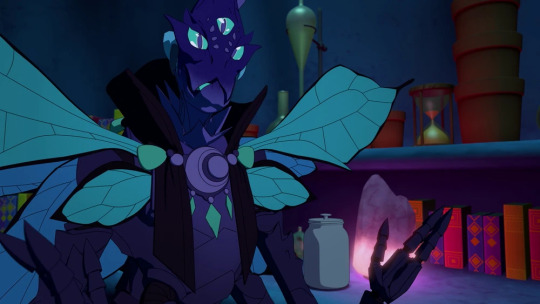
Who alludes to the Caterpillar:
"Who are you?” said the Caterpillar.
“I—I hardly know, sir, just at present—at least I know who I was when I got up this morning, but I think I must have been changed several times since then.”
“What do you mean by that?” said the Caterpillar sternly. “Explain yourself!”
“I can’t explain myself, I’m afraid, sir,” said Alice, “because I’m not myself, you see.”
“I don’t see,” said the Caterpillar.
“I’m afraid I can’t put it more clearly,” Alice replied very politely, “for I can’t understand it myself to begin with; and being so many different sizes in a day is very confusing.”
“It isn’t,” said the Caterpillar.
“Well, perhaps you haven’t found it so yet,” said Alice; “but when you have to turn into a chrysalis—you will some day, you know—and then after that into a butterfly, I should think you’ll feel it a little queer, won’t you?”
“Not a bit,” said the Caterpillar.
“Well, perhaps your feelings may be different,” said Alice; “all I know is, it would feel very queer to me.”
“You!” said the Caterpillar contemptuously. “Who are you?”
Alice meets the Caterpillar, while he is smoking a hookah atop a mushroom. The creature has a key conversation with the girl, as he teaches her how to control her transformations. As a matter of fact he advices Alice to eat the two different sides of the mushroom to turn big and small. In the Disney adaptation, he blows smoke in Alice's face multiple times and ends the scene by becoming a butterfly.
The Herbalist lives in a mushroom and uses the tree leaves to create smoke that forces people to confront "what they are" and "what they wanna become". At the end of his meeting with RWBY, he ascends and is later on reborn as a Butterfly.
Herb's role in the Ever After is to help others become their ideal selves, just like the Caterpillar helps Alice reach her ideal size. At their root, both characters deal with identity and change:
Herbalist: You are making this far more complicated than it needs to be. We all have our titles, our roles to play, but in order to help you become whatever it is you need to become, you should really have a better understanding of what you are now.
It is just that the Caterpillar does so physically, while Herb psychologically. To be more precise, RWBY divides what is united in Carrol's work. Alice's transformations symbolize her inner changes, so to control her size means she understands who she is better. In RWBY, instead:
The girls want to go back to their original size and to reach the tree physically. The Cat frames themselves as the one, who can lead them towards both goals. In fact, they help the girls make the Growgurt Parfait.
The girls need to mature psychologically and to reach acceptance. This is their path to Remnant and to the future. The Herbalist knows it and tries to help RWBY. However, RWBY's ignorance of the Ever After leads to a misunderstanding.
In any case, Herb manages to make the girls self-reflect. In particular, his mist forces them to face their past selves. WBY deal with who they were and show they are ready to bloom into their final selves. Ruby instead is frozen and can't accept who she is:
Past Ruby: So, are you a Huntress? Like the ones you read about in books?
Ruby: I… I don’t know…
In order to find herself, she has to go through a deeper exploration and to accept her darkest emotions. This is why she gets invited to a certain tea party.
A MAD TEA PARTY - DEATH AND GRIEF
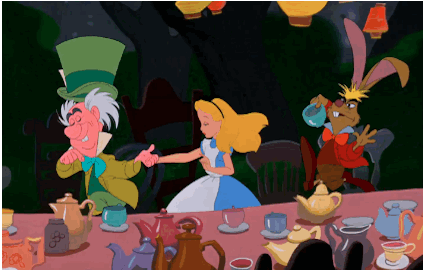
"In that direction,' the Cat said, waving its right paw round,lives a Hatter: and in that direction,' waving the other paw, `lives a March Hare. Visit either you like: they're both mad."
Alice's Mad Tea Party involves three characters:
The Hatter
The March Hare
The Dormouse (the Mouse in the Disney movie)
The trio is stuck at forever five o' clock because the Hatter killed time, while singing. As punishment, Time traps him and his friends in an everending tea party. In the book, the Hatter and the Hare are both mad and try to put the sleepy Dormouse in a tea-pot. In the Disney adaptation, the trio is celebrating an unbirthday party, which ends with the Mouse reciting a poem and entering a tea-pot.
RWBY has three characters allude to the mad tea trio:
Illusion Roman alludes to the Hatter
Juniper alludes to the Hare
Little alludes to the Dormouse/Mouse
Moreover, each one of them resembles a dead character and accompanies the person who misses this character the most:
Roman is the product of Overactive Imagination and embodies Neo's feelings over her friend. He stays by Neo's side and speaks for her.
Juniper shares Pyrrha's golden color scheme and is called after Jaune's team when Pyrrha was alive. She is Jaune's partner in the Ever After.
Little has a personality similar to Penny's and is excited to be Ruby's friend. They attach themselves to Ruby and tag along in her journey.
So, Neo, Jaune and Ruby travel together with a magical creature who embodies a lost loved one. This fits the Ever After being RWBY's realm of the deads, a place for the characters to face grief. Not only that, but these three traveling companions link Neo, Jaune and Ruby themselves to the mad tea party. In other words, the characters' losses are driving them insane. Neo, Jaune and Ruby are mad out of pain. This is why their unhealthy copying mechanisms are highlighted in scenes involving tea.
Neo's mad tea party
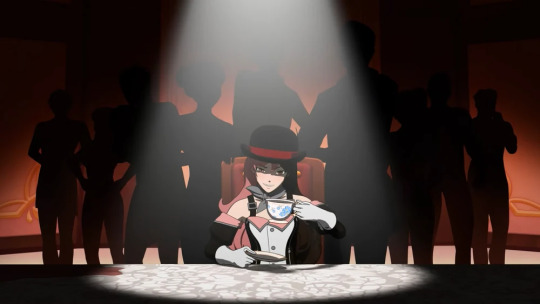
Neo, as the Hatter lashes out at Ruby and organizes a tea-party to celebrate Red's un-birth:
Neo-Roman: You don’t deserve to die, Red. You deserve to be broken down… Torn apart… wiped from existence.
Jaune's not crazy breakfast
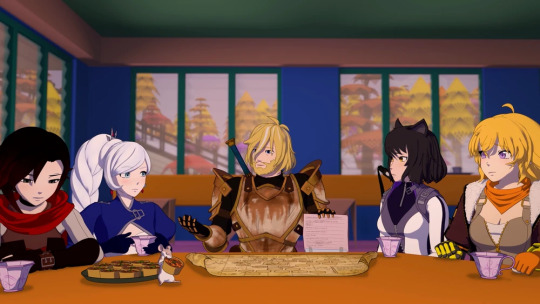
Jaune, as the Hare invites RWBY to his house, where he shows his own instability and hero complex:
Jaune: This isn’t crazy… I’m not crazy… This… isn’t crazy, it’s easy!
Ruby trapped in a tea-pot
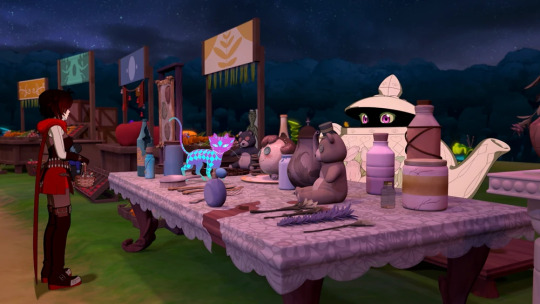
Ruby, as the Dormouse, gives up a part of herself and seals it in a tea-pot. Or in this case, the Teapot Lady:
Ruby: Here! I’ll give you this! I-It carries a mother’s promise!
What is more, the last time Alice looks at the tea trio, she sees the Hatter and the Hare trying to put the Dormouse in a tea-pot:
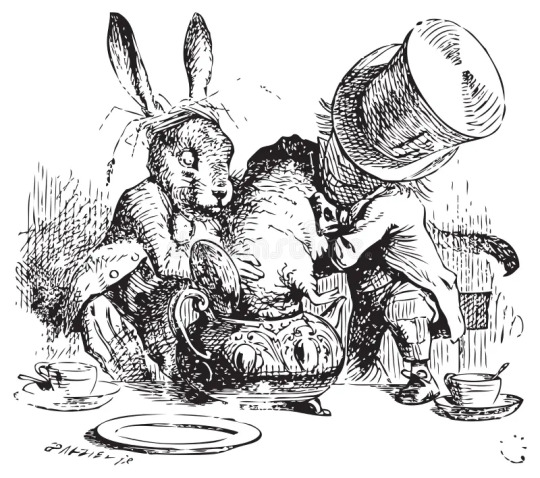
Similarly, Ruby's interactions with Neo and Jaune push her to drink the tea-tree and to ascend. In a sense, Neo and Jaune shove Ruby into the tea, as if she were a sugar-cube:
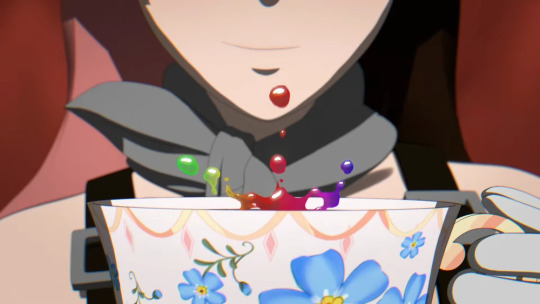
In general, all three characters need to face their loved ones' loss. Only in this way, they can accept themselves and move on. In order for them to grow, they must struggle with death. That is their major conflict in the Ever After and what makes them the three main characters of the volume. Fittingly, they are all major foils of Alyx herself:
Neo plays the part of the villain, but deep down she is a girl, who can't express herself. Like Alyx, she acts selfishly and lets her negative emotions control her. However, by the end she chooses to truly face herself and change.
Jaune plays the part of the hero, but deep down he is a child lost in a magical world, just like Alyx. This is why he needs to reconcile with her to move on.
Ruby plays the part of Alyx, the broken little girl, who loses herself in the Ever After. Still, she is deep down a Huntress and just needs to find herself once again. Her actions heal, whereas Alyx's hurt.
The Alyx who runs away from her responsibilities in a magical world, the Alyx who is saved by a hero and the Alyx who grows up and learns a lesson. Neo, Jaune and Ruby play all these different versions of the Girl Who Fell Through the World. Moreover, they all have additional Carrol's allusions, which define their arcs in the Ever After.
NEO - THE JABBERWOCKY
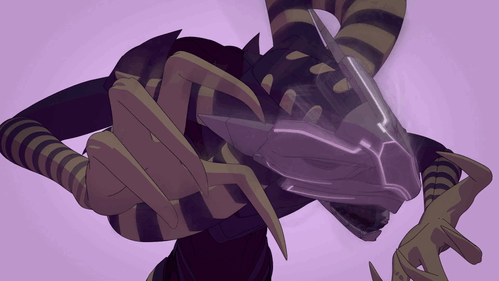
Neo alludes to the Jabberwocky, which is a nonsense poem Alice finds in Through The Looking Glass. This poem:
Tells the story of a child slaying a monster
It is impossible to fully understand
Both things apply to Neo:
She kills the Jabberwalker, but assimilates them in her illusions. In other words, she is both the child who slays the monster and the monster itself.
She doesn't speak and has trouble communicating with others. Even when her illusions talk for her, she isn't understood:
Say something real
Do you only speak in riddles, chatterbox?
I'm waiting for your ugly mouth to
Say something real
Do you only speak in riddles, chatterbox?
I'm waiting on your ugly mouth to spit it out
In other words...
The Jabberwalker represents death and dies unheard:
Jabberwalker: Stop… It… Cease! No! NO! NOOOOOO!
Neo is a villain whose grief stays unrecognized:
Ruby: If you’re looking for an apology, you’ve wasted your time!
Not only by others, but by Neo too. She kills a part of herself in the Jabberwalker.
Not only by others, but by Neo too. She kills it in the form of the Jabberwalker. And yet, her grief keeps festering and comes to the surface through her semblance (the illusory Jabberwalkers). Neo's refusal of it leads to this feeling consuming her, until she gives up control on her body and life:
Curious Cat: You’ve lost something most important, haven’t you? And now you have nothing left. How delightful! An empty host, perfect for me to fill.
It is only by earnestly facing her own pain and vulnerability that Neo saves herself:
NeoCat: No! These cracks, these feelings! I can’t… I can’t!!!
And is ready to finally change:
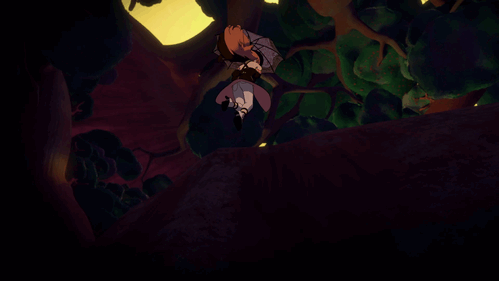
So Neo plays a monster (the Jabberwocky/the Jabberwalker), but is deep down a lost child (Alice/Alyx). She is the most negative interpretation of Alyx, as she is selfish, runs from her responsibilities and hurts others. And yet, she is a person and can change if she is given the chance. She is the Alyx our protagonists need to empathize with:
Ruby: She’ll find herself, one way or another.
JAUNE - THE WHITE (KNIGHT) RABBIT
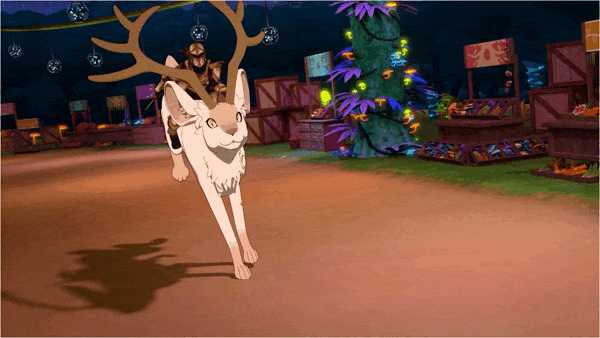
Jaune alludes to:
The White Knight in Alyx's story, as he is a knight, who travels with her and tries to help her
The White Rabbit in RWBY's story, as he tries to guide RWBY, but isn't reliable
The White Knight rescues Alice from the Red Knight and accompanies her to the last square, where the child gets crowned queen. He is described as an odd inventor, but he is one of the kindest people Alice meets. Before separating, he sings Alice a song whose name is The Aged Aged Man. Alice is said to remember this scene vividly in the future.
Jaune becomes an aged aged man in the Ever After and is described by Lewis as an ally to Alyx . As the Rusted Knight, he tries to help the girl and her brother and is remembered fondly by both siblings, despite Alyx's betrayal.
The White Rabbit is a nervous wreck, who is always late and has his home messed up by Alice, who grows big and gets struck in it. Similarly, Jaune is unstable when he reunites with RWBY and even quotes the White Rabbit's famous line:
Jaune: I’m late! I’m late!
Not only that, but RWBY's arrival in the Ever After cracks his heroic persona and he starts showing how hurt he really is:
Jaune: I’m sorry, I… I know I’m not okay. I- I’m not right, but… How am I supposed to be…? I’ve been alone… for SO… LONG! Here… On that bridge… I was the only one that could do it! I was the ONLY ONE!
Until he has his house indirectly destroyed because of Ruby (or so he lashes out):
Jaune: They’re gone… because of you! The Walkers came for you, because Neo. Hates. YOU!
In general, Jaune is late to ascend:
Blacksmith: I’ve been waiting a long time for you.
Jaune: Well, I made it.
Which makes him similar to Alyx. This isn't by chance because Jaune and Alyx are tied. For example, the moment Jaune breathes the tree's smoke, he sees Alyx, instead of his past self. Why is that so? Two reasons:
Jaune frames himself as a hero (the White Knight), but is actually just like Alyx (the White Rabbit). He is a person lost in an unknown world, who takes time to mature.
Alyx is Jaune's inner child, the same way Little is Ruby's. Jaune enters the Ever After and meets a child, who accompanies him in his journey. However, he fails to protect this child and she dies (like Ruby sees Little killed by Neo). Still, just like Little comes back as Somewhat, Alyx too returns in an unexpected form:
Jaune: That’s Alyx’s knife. Wait, how did you have this?
And heals Jaune:
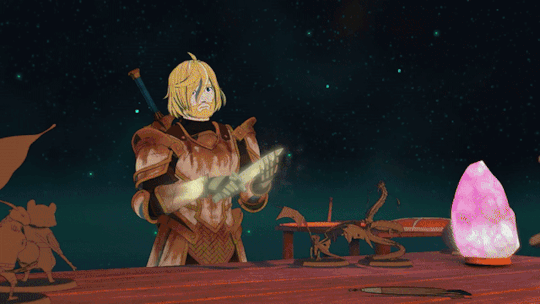
So, Jaune and Alyx share the White Rabbit allusion because symbolically Alyx represents a part of Jaune. She is his least idealized and most vulnerable side. She is the child, who is stubborn and cowardly. She is the damsel in distress Jaune tries to negate and control, which is why she rebels against him:
Jaune: She said she wouldn’t let anyone get in the way of her leaving. That she’d do whatever it takes. And then she was gone.
And yet, she is also the part of Jaune who grows and leads him toward a better self:
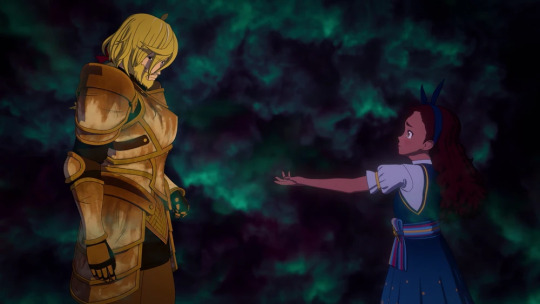
It is only through accepting Alyx in both her flaws and tragedy:
Jaune: Can you… answer a question for me? I need to know if it’s true what the Cat said that Lewis went back and… Alyx…
Blacksmith: Yes. Only Lewis returned home.
That Jaune is able to move on. Just like it is only by letting go of the Paper Pleasers, that he gets to meet the Genial Gems. As a matter of fact the Paper Pleasers' transformation takes inspiration from another fairy-tale: The Three Little Pigs.
Three little pigs build houses to protect themselves from the Big Bad Wolves. The first pig builds a house of straws, which gets destroyed. The second makes a house of sticks, that fares better, but is ultimately blown away. The third one uses bricks and is able to defend himself from the wolf:
Yang: No flood or fire will ever hurt them again.
The Paper Pleasers are made of paper, which makes them vulnerable to fire and water. The big bad wolves come:
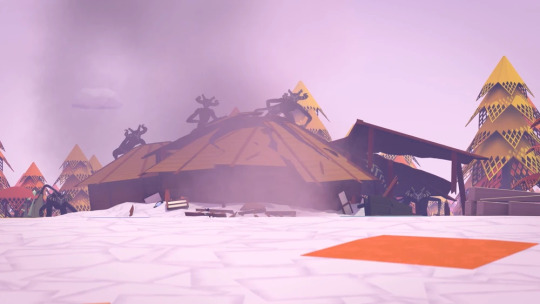
And the Paper Pleasers are destroyed, as a result. In the end, though, they are reborn as rocks, which means they are now stronger and more resilient.
Jaune goes through a similar process. He keeps himself together through the frail paper mask of a noble hero. By the end of the volume, though, he is ready to be reborn as a gem, with a stronger self-identity.
So, Jaune plays a hero (the Rused Knight / the White Knight), but is really a child who refuses to grow (Alyx / the White Rabbit). He is the Alyx that is slow to realize her shortcomings, but eventually fixes them. He is the Alyx who starts as a child, but grows into the heroine of her own story.
Alyx: Maybe it’s time for a change, to be the kind of man you always wanted to be.
RUBY - THE RED QUEEN
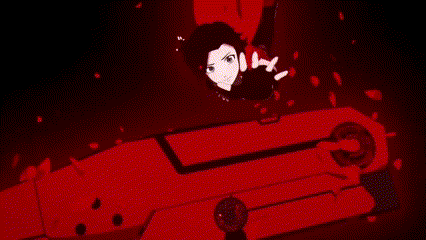
Ruby alludes to:
Alice, who explores two magical worlds in order to grow up
The Red Queen, who moves faster than other chess pieces
In Wonderland, Alice reaches the garden of red roses through a door in a tree. In Through The Looking Glass, Alice crosses the chessboard and is crowned queen. Similarly, Ruby travels through the acres and finally reaches the tree, which leads her home through a portal. What is interesting is that Alice's two destinations loosely use red rose symbolism:
A large rose-tree stood near the entrance of the garden: the roses growing on it were white, but there were three gardeners at it, busily painting them red. (Alice's Adventures in Wonderland, Chapter VIII)
There’s one other flower in the garden that can move about like you,’ said the Rose ‘but she’s more bushy than you are.’
‘Is she like me?’ Alice asked eagerly, for the thought crossed her mind, ‘There’s another little girl in the garden, somewhere!’
‘Well, she has the same awkward shape as you,’ the Rose said, ‘but she’s redder—and her petals are shorter, I think.’
‘Does she ever come out here?’
‘I daresay you’ll see her soon,’ said the Rose. ‘She’s one of the thorny kind.’
‘Where does she wear the thorns?’ Alice asked with some curiosity.
‘Why all round her head, of course,’ the Rose replied.
‘She’s coming!’
Alice looked round eagerly, and found that it was the Red Queen.
(Through The Looking Glass, Chapter II)
The Queen of Hearts' garden is full of red roses, while the Red Queen is described as a red flower with thorns. In short, Alice's final goal is either to find red roses (Wonderland) or to become one (Through the Looking Glass). Well, Ruby has to find who she is (a red rose) and to be reborn as a queen (queen Alice).
The Red Queen is characterized by her speed. In particular, in her scene with Alice, she states that:
‘A slow sort of country!’ said the Queen. ‘Now, here, you see, it takes all the running you can do, to keep in the same place. If you want to get somewhere else, you must run at least twice as fast as that!’
Ruby is the same. Her semblance makes her fast, which ties to her being quick-witted and precocious. At the same time, Ruby's speed is a metaphor for her coping mechanism. She keeps pushing forward, so she doesn't have to face her emotions. This makes so she keeps on running, but can't advance or grow. This is why Ruby's development happens in a moment of quiet:
A moment of quiet is all it takes
To reclaim a life and a promise made
She stops and has a moment with herself, where she faces her own repressed interiority. She confronts her losses and her ideals in the form of Summer Rose. Ruby's mother is her inspiration and who our little rose wants to resemble. Alice wants to become a Queen. Ruby wants to become a Huntress. And yet, Ruby is at the point, where she doubts she can fulfill her dream. She doesn't know if she can truly grow up. So, she is asked to make a choice.
She can either become a copy of Summer (the Red Queen):
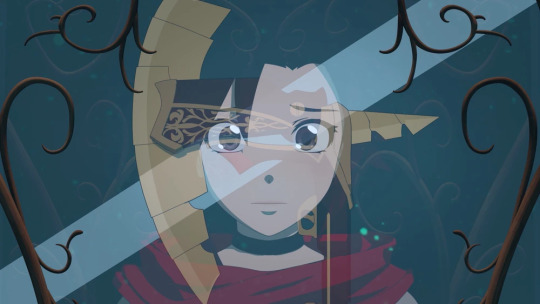
Or she can stay in the Ever After forever, as Alyx (Alice):
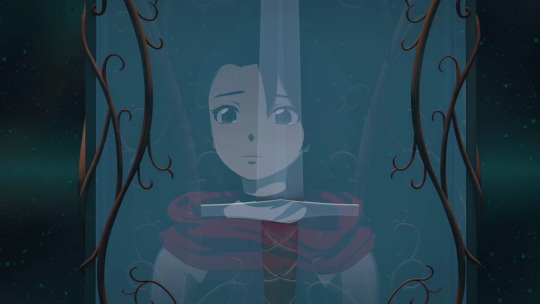
Will she grow up by leaving her ideals behind or will she lose herself in childhood? Will she regress like the Red Prince? And what can she become if even Summer isn't perfect?
Ruby: Are you just trying to tell me that it’s useless? That I shouldn’t even try? Is that the big lesson I’m supposed to learn? Just… give up?
Ruby chooses to simply become herself:
Ruby: This one (Crescent Rose). What happens… if I choose me?
She is asked if she wants to become Alice in Wonderland or if she prefers to become the Hunter of Little Red Riding Hood. Her answer is to be Little Red Riding Hood, who is growing into her own Huntress:
I'll be who you were and I'll be even more
She isn't giving up on her dream of saving people. Still, she is the protagonist of her fairy-tale:
I am the reflection of who prevails
I'm what inspired the fairytale
Alice's doubt at the end of Through The Looking Glass is if she is the dreamer, or if the Red King is. Ruby is instead unsure of who she is dreaming of:
I know it's you and I, when I look inside
Ruby dreams of Summer, both out of grief and as a hero. In volume 9, she starts dreaming of herself. She becomes her own dream:
Somewhat: You do feel… familiar. Like a happy dream I can’t remember.
She becomes her own hero:
(I can guide me, I can guide my way out)
So, Ruby plays the lost child (Alyx), but is strong enough to be a hero (a Huntress). To be precise, she is both. She is Little Red Riding Hood and the Hunter. She is the Alice, who chooses not to give up on her childhood purity, but to grow into an adult in her own way. Without cynism and with hope.
Somewhat: It will be alright, Huntress.
CURIOSITY KILLS THE CAT
Neo, Jaune and Ruby all face death, look inside and grow. Someone else is instead unable to do so:
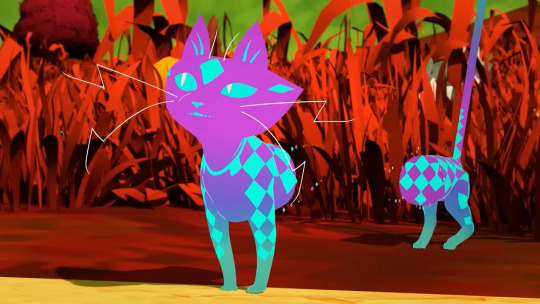
The Curious Cat alludes to the Cheshire Cat, who is depicted as:
Alice's ally in Carrol's Adventures in Wonderland. The Cat gives Alice directions and chats with her during the Queen's croquet game.
A jerkass in the Disney Adaptation. The Cat frames Alice for a prank to the Queen and gets the girl in big trouble.
RWBY takes both characterizations and shows how the Curious Cat goes from a helper to an enemy because of Alyx's betrayal:
Jaune: Alyx broke her promise to the Cat.
At the same time, the Cheshire Cat owes their name to the saying to grin like a Cheshire Cat. The Curious Cat is instead designed after the proverb curiosity kills the cat. Interestingly, the original form of the saying is care kills the cat, which mirrors the Curious Cat's original purpose:
Blacksmith: And so, using the skills and tools they have been given, they began to design their own creations… in utmost secrecy.
The God of Darkness breathes purple fire at the fire. The God of Light picks up a wooden figurine of the Curious Cat and breathes black smoke, thus bringing the Cat to life.
Blacksmith: Soon they realized their new creation could do their job for them. Finding the broken parts of the Ever After.
The Brothers make the Cat to care for the Afterans. Their role is to show empathy and help everyone reach the tree, so they can be fixed. In short, an existential pet therapy. However, the Brothers leave their creation and later on the Curious Cat meets Alyx. As a result, their care slowly turns into curiosity for the Brothers' new creations. Still, Alyx's lie quickly changes this neutral curiosity into jealousy:
Curious Cat: I’m not like the other Afterans here, I’m cursed with curiosity. I need to know everything! But more than anything, I need to know why my makers left me here…
The Cat has their heart broken, but there is no-one to care for them:
Blacksmith: A terrible thing to have a broken heart… And there’s nobody to send them back to the Tree for repair.
This makes the Curious Cat a foil to two characters:
Like Salem, they are outside the cycle of life and death. Or in this case the cycle of ascension. They need to go to the tree, so they can heal and be reborn. However, they can't, as they are designed as a mechanism of the cycle itself, rather than a participant.
Both Gods: So long as this world turns, you (Salem) shall walk its face.
NeoCat: Taking a page out of the caterpillar's book, hm? The leaves have no effect on me.
Like Ruby, they give up pieces of their hearts to others. Still, they grow tired and feel there is no-one, who would do the same for them.
Ruby: Why are you asking me? Because I’m the leader? Because I’m just supposed to have something to say? Cuz I don’t… I mean, why do I have to be the leader anyway? Why do I have to always be the one to pick people up? What about me? “No time”, right? “Gotta get home!” “Gotta help Jaune!” Gotta find someone who isn’t just going to screw everything up! “Gotta stay positive!” Right?!
Curious Cat: Mmmm, when we break or wear out or simply finish what we were made to do, we’re called back. But Herb… his heart was too weak to listen, so I gave him a little bit of mine.
Like our heroine, the Curious Cat is left hopeless and empty by a bad experience. Still, they refuse to face their pain. They never reach acceptance of themselves and others, so they spiral. In particular, they are a negative mirror of all the other Ever After characters:
Like the Prince, the Curious Cat is tricked by Alyx, which is why they hold a grudge against humans. Still, the Prince has some hope to change, while the Curious Cat can't.
Like Herb, the Curious Cat has grown tired of their role of guide. Still, Herb manages to ascend and be reborn as a butterfly. The Curious Cat instead dreams of escaping the magical world.
Like Jaune, the Curious Cat is hurt by Alyx's betrayal. Moreover, both Jaune and the Cat refuse to face themselves and ascend. Still, Jaune wishes to help others. The Curious Cat instead starts hurting them.
Like Neo, the Curious Cat targets Ruby and uses her as a scapegoat. Neo blames all her pain on Ruby and thinks that by killing her, she can feel better. The Curious Cat instead thinks Ruby is the perfect host for them to escape the Ever After. By the end, though, Neo gives up on her revenge. The Cat instead fails to understand humanity:
Curious Cat: You’re broken! You break everything you touch! I call Humans… weak! Confused! Incomplete!
The Curious Cat is then the villain of the volume because they share the other characters' conflict, but fail to solve it positively. Ruby looks inside (the tree), while the Curious Cat looks outside (Remnant). Ruby chooses to become herself. The Curious Cat wants to possess another. Ruby starts developing empathy towards others:
Ruby: But what will happen to Neo?
The Curious Cat instead uses their empathy to manipulate others:
Curious Cat: I gave him (the Hawker) something new to do for the moment. Now go! Your friends need to get big again, or we’re all Jabberwalker dinner!
Their obsession towards humans and Remnant leads to his defeat and demise by the Jabberwalkers' hands. So, curiosity kills the cat, indeed. Is that really the Curious Cat's end, though? The proverb curiosity killed the cat has sometimes the added part but satisfaction brought it back. The Curious Cat is dismembered by the Jabberwalkers' clones. Not by the original Jabberwalker. Does it mean the Curious Cat can't ascend anymore, or is there some hope for them?
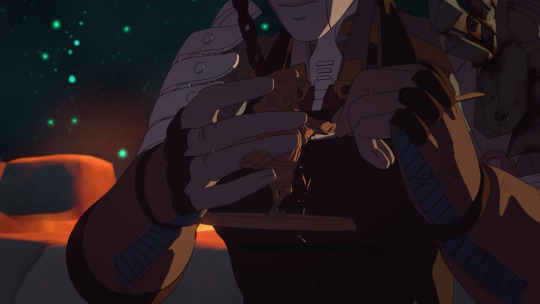
The Blacksmith whittles a wooden figurine of the Hawker, previously killed by a Jabberwalker's clone, and places it with the other figurines of the Afterans.
The series leaves it ambiguous. Speaking of ambiguity...
WHAT IS THE BLACKSMITH?
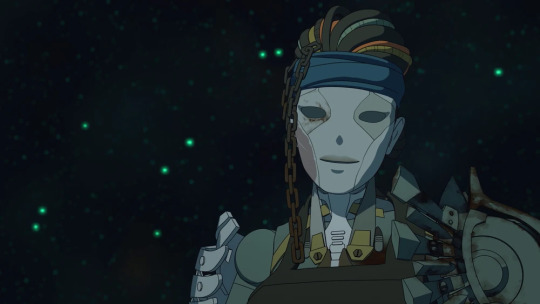
What is the Blacksmith? She is known as:
The Blacksmith
The Tree
Ruby: I wasn’t expecting to be here. Are you the Tree?
Blacksmith: You could say that. But that is a simplistic understanding of the Tree, and what it does.
The Lively Carpenter (possibly)
Weiss: Of all the characters from the book, why did it have to be the Cat? Why couldn’t we have gotten help from the Lively Carpenter or the Rusted Knight? One was sweet, one was handsome, and neither of them had the attention span of a goldfish!
She is hard to define and is a god-like entity. Symbolically, she serves as the Great Mother, as she is an avatar of the Tree, that gave birth to the Brothers. She guides Ruby and the other characters towards self-actualization and adulthood. At the same time, she explains the balance between life and death, creation and destruction:
Blacksmith: She will have the chance to return her broken heart… And becomes something new. Such is balance.
So, she is tied to both transformation (growth) and death (grief). These ideas are well expressed by her design. On the one hand she appears bigger than humans and is a blacksmith, who molds others. On the other hand she loosely resembles several dead characters:
In her first appearence and in the opening she appears made of golden metal, which makes her look similar to Pyrrha
Se is robotic, like Penny
Her hair resembles a detail of Alyx's outfit
This doesn't mean she is any of these characters, but simply that in a volume focused on dealing with loss, her appearance has missed people come to mind. So, she herself embodies this idea:
Blacksmith: Nothing. No one is ever truly lost.
The deads still exist in the heart of their loved ones and in the stories that are remembered and told.
ALYX'S EVIDENCE
Blacksmith: The Girl Who Fell Through the World is the story as he wished it happened.
The Girl Who Fell Through the World is a children classic written to deal with grief. It is a tragedy turned into a fairy tale, which is what RWBY must do with Remnant itself. It is what they have already done with their sequel to Alyx's story:
Blake: Do you guys think… we might have… made things even worse in the Ever After? Just like Alyx did?
Ruby: I’m… not sure. I'd like to think we did at least a little good. Right?
Alyx herself offers some important teachings. Some evidence worth to consider:
Alice grows up by waking up from the fairy tale. Alyx instead grows up the moment she chooses to stay in the fairy tale and fix it.
Alyx is similar to two Maidens our characters have met in their journey.
1- RWBY frames growing up not as forgetting who you were as a child, but as becoming a person your child-self can be proud of. This is why Little becomes Somewhat:

They look similar to Ruby. At the same time they are still far from being complete:
Ruby: Do any of those sound close?
Somewhat: Hmmm. Somewhat. Yeah. Somewhat. I’m not any one thing, I’m somewhat of a lot of things!
Otherside,
Did you mean to make me half or whole?
Will I ever be (complete)?
When will I become all of me?
However, they are on the right path. Just like our protagonists.
2- Alyx is a girl all the characters misunderstand and objectify. In the end, though, she manages to affirm herself by leaving behind a part of herself. Doesn't she remind you of anyone?
Penny: I won’t be gone, I’ll be part of you.
Penny is a child, who gets controlled and manipulated and dies too soon. She still self-actualizes and affirms who she is with a final choice and legacy.
Alyx is a girl who is selfish and cruel, but finally opens her eyes and chooses to change. She dies, but manages to fix what she has broken and saves Jaune. Her story probably mirrors the outcome of Cinder's arc. Our Cinderella will have a heel realization and affirm who she is in a final act of selflessness.
In other words, Alyx's story is meant to be a bridge between Penny's tragic death (past) and Cinder's final sacrifice (future). It is used to help the characters overcome Penny and Atlas, so that they are ready to help Cinder and Vacuo:
Ruby: Where will this take us?
Blacksmith: Not where, when you are needed most.
#rwby#rwby meta#rwby volume 9#greenlight volume 10#once upon an allusion meta#my meta#ruby rose#jaune arc#neopolitan#curious cat#red prince#herbalist#little#somewhat#the blacksmith
81 notes
·
View notes
Text
Ozcarnation merge musings from my twitter
I wrote these months ago and finally sharing them on tumblr.
Why I differentiate between Ozma and Ozpin, a 🧵


I disagree with the general interpretation of where the merge subplot is actually heading in canon: most people think it will actualize, I think it will be reversed, either stopping the merge for good or reversing it after it comes very briefly into reality.
Oscar's arc, paralleling Ruby (mainly, but other characters share the trait as well) has been about him trying to find his own place and his own story, but the shadow of supposed ego death is always looming on him and terrifying him.
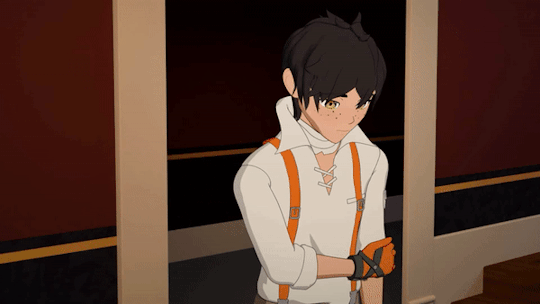
Everytime he takes a step forward, he's reminded again of the expected fate for him, something that some characters actively want (like Ironwood).
Examples:
volume 6, after being treated as a stand-in for Ozpin, currently MIA, Oscar takes his own decision to forgive the team and be prepared for battle alongside them. While reconciling with tem, with his new combat gear, he still can't help but be haunted of "how much time he has left".
Volume 7 places him in a conundrum the entire volume: he's developing as a fighter, growing up as an adolescent and forging stronger relationship with his newfound friends. Jaune clearly comes to see him as a little brother and there's something interesting going on with Ruby that may or may not result in a romantic relationship down the line. The team actually worries about his opinion on stuff as well, and Ruby clearly values him as Oscar Pine. Meanwhile, the very person who's helping in his growth is James Ironwood, who cannot shut up about wishing Ozpin was there everytime they meet, and telling Oscar he will basically cease to exist to his face with a big shiny smile. It's unclear at this point if James knows or not about how terrified Oscar is of the merge, as the boy never voices this fear. I think he just wants not to think of it. So even at the end, where James finally says "fuck it, Oscar or Ozpin, i don't need either" and shoots him, Oscar starts coming onto his power, in a scene that's both powerful and bittersweet, paralleling Penny.
Both of them, for their qualities, were chosen by a magical destiny, one capable of beautiful and powerful magic, that they don't want, never wanted and will struggle with with the next volume. Penny's arc is a direct parallel and commentary to Oscar and the way it ends might comment on Oscar's arc. Not in death but that Penny could finally show everyone she was her own person who could choose for herself.
Coming back to volume 8, Oscar has his worst time yet, finally voices his fear of merging with Oz, and comes back from it scarred but stronger, having helped Ozpin trust himself and others and gaining a new ally in Emerald.
But, see where I'm getting at? This is no resolution.
Oscar has briefly shown his fear but at the end of the volume, much like Ruby has done for several seasons, swallows the literal torture he endured for half of it and the fear of imminent ego death due to reawakened magic, and chooses to focus on the positives.
Boy, if he had fallen into the ever after maybe he would have healed too. Or maybe we would have no plot at all bc Oscar and Ruby would have noticed each other's pain, which would have been nice as well, but sometimes therapy has to be brutal.
And also Oscar can't conclude his arc in the ever after because his own is complimentary to Ruby's but also a contrast to it. Ruby wants to emulate her mother and ideal of what a hero is and must learn that she is enough as she is already. Oscar does NOT want to emulate or be his father figure, whose og incarnation was basically THE ideal hero of fairytales. He wants to be enough but doesn't know who he is yet, since everyone keeps telling him to his face that Oscar Pine isn't enough.

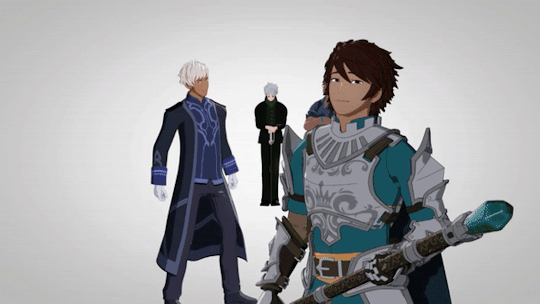
SO anyway. If both Penny (a commentary on Oscar) and Ruby (a direct parallel)'s arcs end with them realizing their own individuality, I 100% believe Oscar's arc will end like this as well.
And when i say end i mean end is just a new beginning.


Before moving to my final argument, let me also briefly comment on how Jaune and Weiss' arcs are similar but different to Oscar and Ruby's. It's interesting because, by main character status, Jaune as the leader of team JNPR, is a lancer and a foil to RWBY and Ruby inside of team RWBY's dynamic, Weiss, as Ruby's partner, is the lancer and foil to Ruby and inside new JNPR/ORNJ, Oscar, as Jaune's new partner, is his lancer and foil.
And both Jaune and Weiss deal with identity but more in a role they want to play as expected to what their family might want, initially, and later as the knights they idealized in fairytales. This is way too long for this post, but again, fascinating. And also Whiteknight slays.

So, my final thesis:
Oscar's arc will end with him affirming his own individuality over the merge.
So why can't Ozpin also do the same?
The god of light's intention in bestowing Ozma with this method of reincarnation was the positive idea of him never being alone.
And this works, more or less, in different lifetimes. Even in the very first, the farmer who we initially assumed was completely eradicated, still voiced his opinion and reminded Ozma of the good path.
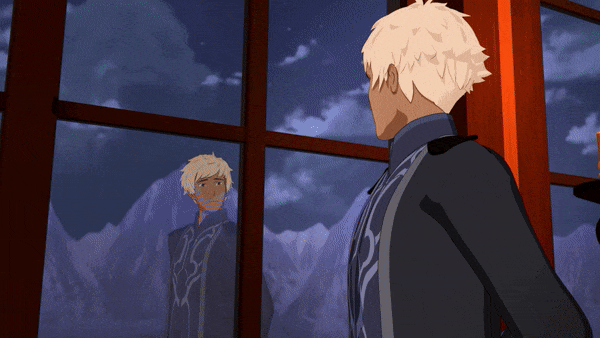
In later lives, the spirit and the host lived more comfortably, having estabilished an equal partnership.
But... They still end up as one person? They're literally so like-minded that their enormous guilt complex makes one believe he's responsible for everything the others did?
I feel like this is what the story is trying to say, much like what many characters say of Oscar, and it's framed as a bad thing.
And incorrect. Oscar is always "punished" for what his predecessors did because he will be Ozma eventually.
The voice still going by the name of Ozpin feels responsible for everything that happened since Ozma was brought back to life and literally agrees with his own torturer that yep, he deserves all the punishment and pain for it.
Every incarnation eventually reaches a point where they start to identify with their predecessors in such a way that contradicts what the god of light's intention was (then again, we have been shown time and time again that the god of light is not very good at his job).
Instead of a partnership where each soul helps the other moving forward and never los hope, we have a continuous cycle of guilt and self-abuse accumulating. Oscar is gnawing at it the entire time. Who's to say Ozpin, as the professor, also didn't?
And Oscar is going to break the cycle.
As he does that, I want Ozpin to also realize his own individuality.
This is why I want an happy ending for all the incarnates, not just Ozma. Merged they may be for now, in the physical realm, why should only Ozma move on to a peaceful afterlife? All the people who ended up clogs in the ever ticking clock and had no say in it were all people with their own lives, their own friends and families, their own name. And they deserve peace too.

#ozpin#oscar pine#ozma#ruby rose#jaune arc#penny polendina#weiss schnee#ozcarnations#rwby#rwby meta#professor ozpin#ozma rwby#headmaster ozpin#rosegarden#whiteknight#oz family#i wrote a thing#ozma 2.0
70 notes
·
View notes
Text
Why the WhiteKnight ship makes many in the RWBY Fandom uncomfortable


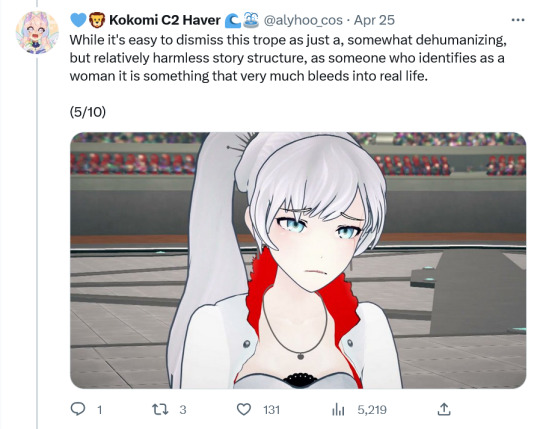


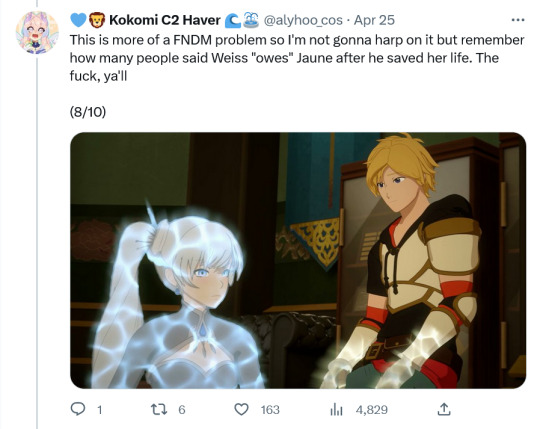


RWBY discussion by Alyhoo
https://twitter.com/alyhoo_cos/status/1651001105067679744
#rwby#jaune arc#weiss schnee#rwby weiss#rwby jaune#rwby discussion#rwby meta#rwby fndom#rwby fandom#rwby character discussion#rwby analysis#alyhoo_cos#alyhoo cos
282 notes
·
View notes
Text
yknow the way rwby thinks about heroism may not be the most subvertive or otherwise super noteworthy compared to how other media handles the concept, it is still fascinating as a core of the show. in rwby, heroism is an ideal, it is a stained glass window, a mural on a wall, a storybook picture. you can't actually reach it. and yet they try regardless.
ruby herself is pushed toward it due to her resemblance to her mother, who was that storybook and then suffered (and perhaps still does) endlessly for it. and while i do deeply believe summer was a person and fell flat just like every other member of strq, narratively summer rose is just a concept.
jaune and oscar are both representatives of two highly troped stereotypical (male) heroes, but the key difference is what they're given and what they take. jaune is actively laughed at for trying to be a hero, but will grip onto every scrap of the concept he can. in his worst moments, he's parellel to ironwood in this way, stubbornly sticking to his slowly warping ideas of heroism as he continues again and again to fail to achieve it and lowers his own bar hoping to impress everyone when he clears it. versus oscar, who is handed the (metaphorical) sword of heroism repeatedly, wincing each time its placed in his hands and tries to drop it aside. but there it is again, in his hands.
or cinder, who is not a hero in any way. her mentor in her youth called himself a hero, and she has been disgusted by the idea ever since. she despises heroism and feels she must snuff it out. which is how salem gets to her, because salem too feels hurt by the concept of heroism through oz's strict adherence to it and how that turned him against her. and so as much as the both of them swear against it, they too are shaped by the idea.
because remnant is a world of heroism, even in its unattainable state. because the gods shaped it so. the gods are storytellers, and treated humanity like playthings to make chase after goals they'll never reach.
60 notes
·
View notes
Text
For all Jaune’s criticism of Alyx treating the Ever After as make believe where she could do whatever she wanted, he’s not actually that different from her in that way. He’s just playing a different kind of make believe, which on the surface is more benign but is still harmful and paternalistic.
Jaune is seeing the Ever After through the eyes of a traumatized man who wants to protect human lives. But the Afterans are not human and trying to act as if they are is harmful. None of the Afterans have shown anything resembling discontent or fear about the process of ascension. It's a natural part of their existence. Jaune sees it as being equivalent to death on Remnant despite the inhabitants trying to explain otherwise. He's an outsider imposing his idea of how the world should work onto a world that clearly does not fit his views.
When Jaune says Afterans are "too smart, too dumb, or too crazy to be trusted" he's using that as an excuse to dictate their actions because "they don't know what they want". But for the most part the Afterans we've seen haven't been dumb, crazy, or maliciously conniving. They're just weird because their world works by extremely different rules, rules that Jaune is not able to accept.
I am tremendously sympathetic to Jaune, but he's making assumptions and thinks he knows better than everyone else, because he's desperate to actually be a hero and not a perceived failure.
#just to be clear this is NOT anti-Jaune I love the guy#but he is NOT coping well and it's causing problems#jaune arc#the rusted knight#rwby spoilers#rwby#rwby volume 9#rwby9#rwby meta#alyx rwby#rwby alyx
140 notes
·
View notes
Text
I need to talk about RWBY's Jaune Arc
okay this is 1.6k words, immaaaaaaaa put a cut
Okay so going into RWBY back in 2019, that was great right. I was in the middle of getting my degree in creative writing I was seriously burnt out from how formulaic stories had gotten for me, and then comes along my friend being all YOU SHOULD WATCH RWBY. And I said, SURE
now my friend knows my types and she nailed who my favorite character was going to be (Oscar) and she also nailed who my other favorites would be (Ren and Qrow) and I'll admit, 90% of my investment in RWBY was ya know, my favorite boys (Don't worry I love plenty of the girls, it just happened that my top 3 ended up being guys this time around). And wow RWBY was just such a breath of fresh air for me given all the story telling stuff I was learning about in college
and specifically, now that we're like waiting for volume 10 to be greenlit, I'm surprised by how much I've grown to like Jaune
I used to not care for Jaune/find him mildly annoying in Volume 1. He was the... audience stand in, so he had to be a little dumb. He was falling into a little bit of a stereotypical pretending to be confident to impress the ladies role. But ya know, I didn't hate him. He just wasn't my favorite of team JNPR
then volume 2 comes around and he has his whole IMMA INVITE WEISS TO THE DANCE WITH ME :D and I was not about that, it was pushy, and also, I really do not care for that sort of romance in the stories I'm engaging with, and then... it didn't go that route. He realized that Pyrrha wanted to go with him, that he had been unintentionally insensitive towards her, and pursued a girl who didn't even care about him who liked someone else. And Jaune just went "alright, damage control, gonna get Weiss what she wants and gonna give Pyrrha what she deserves" and that was the first time instead of being neutral or annoyed at Jaune I thought ya know, this guy... this guy has good bean potential. I'm interested in seeing where they take him next
And then there's Volume 3. He's been training with Pyrrha, he's been more supportive as a partner, he's been TRYING to be a good leader for his team, like he's not perfect at any of those but he's TRYING and he's lost a lot of the traits that I found annoying originally. Now he's starting to full step into the supportive wholesome leader role. And then, ya know the finale happens and just... ouch. Things were looking up for White boy, and the rug wasn't just pulled out from under him, it also slapped him in the face and threw him down the stairs
Now through Volumes 4-5 Jaune was still in the "I'm pretty meh" about him territory. There were moments where I found myself deeply empathizing with him, specifically in the scenes that showed him mourning Pyrrha, especially because well... I've been there. I've lost someone I was close with when I was 17 too. Extremely different circumstances but that thing where you put on a video of them and you watch it over and over and over because you so desperately want them back, that you're reaching for wisps and smoke of what used to be them all for a brief small chance to feel their presence again. And it's just, it's never enough. No matter how many times you watch the video, no matter how many times you replay their voice talking to you, no matter how many times you listen to old messages they sent you, they are gone and nothing in the world is going to change that. It hurts. It hurts so bad
this boy is GRIEVING
but, he was being bitchy. And look, I don't blame the guy alright. Grief messes you up as a person, it brings out sides of you you didn't know you had, it prevents you from being the best version of yourself. I. GET. IT. But he was being bitchy towards Qrow(aforementioned fave, special mention to that time he slammed Oscar ANOTHER FAVE against the wall), and at the battle of Haven, he initially let his grief and anger get the better of him, and ngl I couldn't watch. (To clarify, absolutely no shade to the writers, this was GOLDEN, peek character writing and whatnot) But that is what Jaune's arc is about at the end of the day. I'm not saying the other characters aren't grieving too, they absolutely are. But Jaune's arc has a lot more focus on how grief hurts and changes a person, how it gets the better of us, and how ultimately, if we want to move forward, if we want to keep going, we cannot just fight it and resist it because it feels icky. We cannot just sit in it because we hate what happened and happiness feels fake and forever gone. We cannot pretend the grief isn't there either.
Cue Volume 6 where he was mostly backstage, but all of this comes to a culmination at Pyrrha's statue and Jaune finally gets a moment where he gets to sit with his grief. Really sit with it. In a way that isn't anger, or repression, or wishing things had been different or that Pyrrha was there. He got to sit with his grief with the reality that it was. He lost Pyrrha. And it hurt. Maybe it was senseless. Maybe he really couldn't have done anything. Maybe it really does hurt so bad. But at the end of the day, it had been Pyrrha's choice to try and do something. And for better or for worse, she tried. And the rest of his team confront him. Ren and Nora are quick to console him, and join in on the grieving. And they also confront him about his behavior in season 5, where he believed that he didn't matter so long as his friends got to live. And here are Ren and Nora telling him, buddy, you DO matter. You matter so much. You matter to us just as much as Pyrrha mattered to us. We all chose to be huntsmen, so let us grow together and honor her choice even if it hurts. We can hurt together and we can take comfort together.
And listen, up until this point, when I was watching RWBY, Jaune was not my favorite. He never had been. He was just a guy that was there going through his own arcs. But after this key moment in volume 6, suddenly I find himself enjoying seeing him whenever he was on screen
for the rest of volume 6 he slips naturally into an empathetic leader. Stealing the ships was his idea but he let everyone take the roles they were good at, he played good support, he protected his team when possible. AND THEN WE GET TO 7 AND 8 and omg
friends
this is when I started loving Jaune. Suddenly, it's like he found a balance, he found himself. He was still hurting but instead of being angry he was being compassionate. He was still goofy and fun, but he was no longer annoying being respectful of people. He was no longer blundering about on the battlefield but he was moving with purpose and with skill. This Jaune feels like an entirely different character than the Jaune we first met back in volume 1. He's fallen into a character role that I personally love. I love the empathic leaders who are a little bit goofy. I love them to pieces. I love their level-headedness, i love their compassion. I love their gentleness. But what made Jaune special is that we got to see how much he had to suffer to get there. He was doing the best he's ever been, and he was being so kind and so humble (straight up, tempted to do a time travel AU fic or something with baby jaune and leader jaune meeting each other cuz they'd be so different)
Then we reach the end of 8 and ya know
THAT happened
and of course Jaune's arc is always about grief. But what a stroke of genius, have him find his footing and then REtraumatize him. ngl, I ALSO have been there, and imo the retraumatization is almost worst than the originally one, especially if you haven't properly dealt with the OG emotions because now THOSE come rushing back AND you've got new fresh ones to deal with. Call me a sadist. Accuse me of projecting my own trauma or whatever, but genuinely I loved what they did with Jaune in volume 9. It was *chef's kiss*. The unhealthy coping, the latching onto and hyperfixating on a single thing that ultimately is the opposite of what he needed, forced to be alone for decades, betrayed by someone he tried to help, being reunited with his friends without having processed or dealt with any of that and STILL trying to be friendly and kind and gentle to them while barely keeping it together- it's just SO GOOD
and ultimately he does break. But his friends are there with him, just like Ren and Nora helped him in volume 6. He's still the gentle leader he's grown into, but now there's just so much more to it, there's so many layers
I'm genuinely so excited to see where they take him for future volumes. He still can't dethrone my favorites BUT he has climbed the ranks of my favorite characters so fast that I wouldn't have believed you if you told me when I started watching RWBY that the character I found most annoying would end up being one of my favorite RWBY characters
soooooo yeah
I really love Jaune now
controversial opinion, I love his short hair
#Jaune Arc#RWBY#meta#?#Analysis#??#i just needed#to ramble about Jaune#HIS GROWTH AND DEVELOPMENT IS SO GOOD#I WANT TO SCREAM#again he's not the only character dealing with grief#but he is the character who gets a lot of focus when it comes to grief#watching his growth and arc is very cathartic for me#idk i just enjoy the white boy#absolute loser#I hope he remains a loser#gentle leader loser#10/10
36 notes
·
View notes
Text
As a result of their experiences, Team Remnant have become Discworld-Atheists; They know gods exist, but refuse to pray to them.
#RWBY#Greenlight Volume 10#Support CRWBY#Discworld#Atheism#Ruby Rose#Weiss Schnee#Blake Belladonna#Yang Xiao Long#Jaune Arc#Nora Valkyrie#Lie Ren#Oscar Pine#Meta#The Two Brothers ruin religion
22 notes
·
View notes
Text
Syzygy, or Animus and Anima: Weiss and Jaune
Anima-Animus anon, here is your meta. I genuinely do think Weiss and Jaune are one of the best literary examples I've seen of animus and anima, respectively. This is not inherently a shipping meta, although you could read it that way.
Of note: I did talk about Jaune and anima before here in a larger meta about his arc, and about Weiss and animus here. But I want to talk about their arcs because they are complimentary, and really encapsulate how to write anima and animus pretty perfectly.
So let's go over it. What is anima? What is animus? How is Jaune one of Weiss's animuses? How is Weiss one of Jaune's anima? And what does this mean thematically for their arcs and the work of RWBY as a whole?
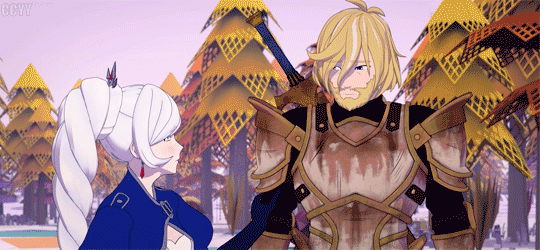
Jungian Archetypes
I have a whole meta on Jungian archetypes in RWBY. But I just want to quickly go over some of them because I'll use these terms in the meta.
Persona: the part of ourself we present to the public. It's usually somewhat fake, or at least societally acceptable.
Shadow: the part ourselves we repress because we do not want to acknowledge the parts of us that are selfish, hurting, weak. End goal: integration with the shadow and accepting that these are parts of you. In literature, the shadow is often negative or antagonistic if embodied in a character, because facing it requires facing character flaws. However, only by integrating with the shadow do we start to heal. It's necessary to become a complete person. Associated with the Black stage in alchemy, and with Blake.
Anima/animus: the feminine/masculine within ourselves. This can overlap with the shadow in some ways (for example, men often don't want to admit that they're weak). Anima/animus can be positive and negative. Associated with the White stage in alchemy, and with Weiss and Jaune. You don't have to interpret it as romantic, but it often is.
Self: The Self is the end goal of Jungian psychology: achieving individuation, or the fullness of being who you are and knowing your role in the world. Associated with the Red stage in alchemy, and with Ruby.
Syzygy: the union of anima and animus.
Lastly, I want to disclaimer about the terms "masculine" and "feminine" here. Jung was writing at a time when gender binaries and roles were very much a thing. Of course they apply less today (and RWBY deliberately plays with some of these, as we'll see). But when I use the term "masculine" or "feminine" in this meta I mean in the traditional sense Jung is talking about. Masculine=bravery, physical power, fear of the weak. Feminine=beauty, emotions, kindness, etc. Please note this is clearly oversimplified and I am not endorsing this, just explaining a pattern that Jung pointed out in regards to literature.
Jaune and Anima
Between anima and animus, anima is more likely to be romantic in fiction. That's because Jung associated anima with something he called Eros (Greek for romantic/sexual love). A man's anima is also almost always one person at a time. This is not the case with animus, as we'll see.
Hence, the two women associated with Jaune's anima are Weiss and Pyrrha.
The previous meta I did on Jaune's arc makes a strong argument that Pyrrha firstly embodies his anima. She almost perfectly goes through the first three of four stages of anima in regards to how Jaune views her, which are:
Eve (mother)
Helen (romantic interest)
Mary (religious devotion)
Sophia (wisdom, guide to the inner life)
I would also argue that Pyrrha embodies Sophia too here, but the living Sophia is also Weiss. Sophia is Greek for "wisdom," and both the official RWBY Twitter account and the show itself make the connection explicit for us, with the Curious Cat calling Weiss "wise Huntress."
But it's also deeper than just stages here. Jaune's entire arc is about the rejection of toxic masculinity and the embrace of his own role as maiden. Only through becoming a Maiden (in other words, embracing the feminine within) can he become a Knight (the man he was meant to be).
Jaune As The Maid of Orleans
Jaune's allusion is, of course, Jeanne d'Arc. He has a feminine allusion, which tells us to expect his integration with the inner feminine. Joan of Arc was also know as three things:
A spiritual guide to France in wartime
A soldier/knight
A maiden
In real life, Joan of Arc was dismissed because she was just a girl... until she started actually winning battles and her predictions came true. God or not, there's something really powerful and intriguing and eerie about her story. Joan of Arc referred to herself as "Jeanne la Pucelle," or "Joan the Maiden."
But what is a Maiden? In Joan's time, it literally meant "virginity," because there was a prophecy that France would be restored by a virgin. In other words, her virginity was a strength--spiritually, at the time period, her going to war with men yet maintaining her virginity was seen as a sign of righteousness (yes, it was very anti-sex).
In RWBY, a maiden is also hardly a weakness. No, a Maiden is a specific type of power.
It's also associated with martyrdom.
Jaune has had special relationships with several of the Maidens in the series: firstly, Pyrrha, who chooses to kiss him (a nice pro-sex commentary honestly) before dying as a Maiden even though the power had not been transferred to her. Pyrrha ends up a martyr like Joan of Arc, but her legacy, like Joan's lives on. Pyrrha embodies what Jaune should become.

Penny, of course, dies as a martyr too. She is stabbed by Cinder and there isn't time to save her. Jaune, who defines himself as a healer thanks to his semblance, has no choice but to kill her so that Penny stays in control of her destiny. It's tragic, but like Pyrrha, it isn't empty.
Of course, Cinder has now killed Jaune's first love interest, tried to kill another (Weiss), and then made Jaune into a killer via stabbing Penny. Hence, Jaune and Cinder are also linked, and the message of what a maiden should be, and what destiny is--the message Pyrrha carried, the message of choice embodying destiny that Penny carried--is something I suspect Jaune will give to Cinder before the end.
Still, all of these incidents, the three big alchemical deaths of the series--Black Death, White Death, and Yellow Death (Crocea Mors)--involve Jaune and specifically switch the gender of what you would expect from a hero.
The Knight is supposed to protect the Maiden. Instead, the Maiden kisses Jaune and locks him away to save him while she fights Cinder. Jaune is supposed to protect the Maiden, but she (Weiss) gets impaled precisely because he couldn't get over his previous failure to save Pyrrha. This time, though, he saves Weiss.
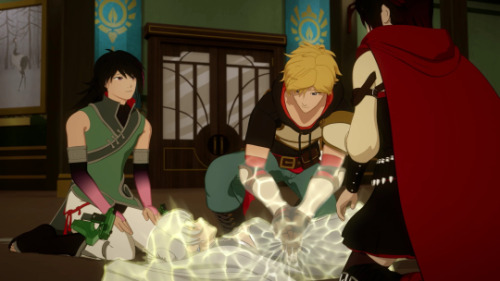
The thing is, though, that healing is traditionally a feminine attribute. Hence, Weiss lives and Jaune heals because, symbolically, of his ability to embrace the inner feminine.
Lastly, the Knight is supposed to save the Maiden. But instead, saving the Maiden looks like becoming the monster himself, like becoming his shadow (which Cinder is). It shatters his sense of self, as we've been seeing throughout Volume 9.
If a Knight is also a dragon killing a maiden, who is he?
Jaune As The Rusted Knight
Jaune's sword is broken, and he intensely clings to this persona of "knight who saves" the entire volume. But by intensively insisting on saving the Paper Pleasers, he doesn't realize he's repeating what Ironwood et al did to Penny: refusing to allow them their own right to choose their destiny. He also fails to save Alyx.
Jaune's "knight who saves" persona has been a key part of his character since the first season. He cheats to get into Beacon because he wants to be a hero and carry on his family's legacy. He's embarrassed to be so weak, but the only way to become strong is to rely on women. Team RWBY, Pyrrha, even Nora and Ren (who don't fit gender stereotypes themselves).
Pyrrha literally trains Jaune. Notably, whenever Jaune relies on male advice, he fails. In fact, his knight persona is precisely why Weiss doesn't like him at first (not just romantically; like, at all.)
Weiss: (separating the two) Jaune, is it? Do you have any idea who you're talking to?
Jaune: Not in the slightest, snow angel.
Jaune: I don't understand. My dad said all women look for is confidence! Where did I go wrong? (accepts Ruby's offered hand and uses her to lift himself back up)
Yang: "Snow Angel" probably wasn't the best start.
Jaune's confidence and understanding of women coming from his dad instead of like, actual women, means he's going to make an arse of himself. And he does. At first.
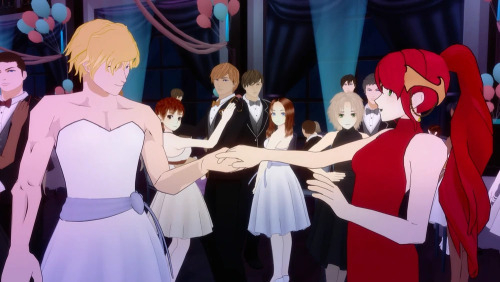
But, Jaune starts to integrate with the feminine through not just Pyrrha training him physically, but also through doing things like dressing up as a princess and going to the dance like that to honor his word to Pyrrha. He gets closer to Weiss by talking to Neptune about feelings rather than by impressing her through feats of strength. He then saves her life via delving into a traditionally feminine power. And in the end of Volume 9, he is restored to his young self via Alyx, the girl he thought he couldn't save.
Weiss and Animus
Oh boy, animus.
Okay, so... Jung did not write nearly as much about animus as he did about anima. Supposedly that's because he's a dude and recognized that he could not actually experience animus. Fortunately, his wife Emma wrote a lot about it, as did some direct colleagues (like Marie-Louise von Franz) who specifically applied animus to its portrayal in fairy tales.
Animus differs from anima in a few key ways. The centrality of the concept--that it's the masculine within a woman--remains the same. However, animus:
is not usually limited to just one person at a time like anima;
doesn't follow stages nearly so neatly (they exist but are a bit... debatable)
is not inherently based on Eros, or a romantic understanding. No, instead animus is based on Logos.
What is Logos? Logos is literally "word" in Greek, but the actual usage is more akin to "mind" or "spirit." Weiss, of course, is a mind character. It can also refer to the principle of the matter. In other words, a woman looks for her masculine traits in a principle she holds dear.
Jung himself said:
The male personification of the unconscious in the woman — the animus — exhibits both good and bad aspects, as does the anima in man. But the animus does not so often appear in the form of an erotic fantasy or mood [as the anima often does to men]…even in
a woman who is outwardly very feminine the animus can be an equally hard and inexorable power. One may suddenly find oneself up against something in a woman that is obstinate, cold and completely inaccessible.
Weiss as Princess Snow White

Weiss starts off possessed by her negative animus, the Logos or principle.
What is animus/anima possession? It's specifically a negative manifestation of the animus (or anima) wherein someone behaves overwhelmingly like their masculine side--but in a negative sense. In other words, for Weiss, this looks like a persona of toxic masculinity.
Possession caused by the anima or animus presents a different picture... The animus is obstinate, harping on principles, laying down the law, dogmatic, world-reforming, theoretic, word-mongering, argumentative, and domineering.
I kinda do think this sounds like early-volume Weiss. But it also sounds like... Jacques Schnee.
See, the animus is also often a reflection of a woman's father. Even though Weiss is determined to prove herself without her father's influence by the start of the series, we also see that she is in some ways behaving like him. Of course she's not nearly so ruthless or bigoted, but she does maintain some prejudice about faunus, maintains entitlement (demanding to be leader of RWBY), tells off Ruby for accidents, etc. She's denying her femininity.
But then her development starts, and with this, her animus changes. Who are her animus?
Well, as I said above, animus has multiple presentations, and for Weiss they're specifically unique... because some of them are women. Make of that what you will, shippers and headcanoners. I'm not just going off of nowhere in saying that I think some of Weiss's masculine animuses are women, either; I'm specifically talking about it in regards to Weiss's allusion of Snow White.
You can find numerous fairy tale analyses with animus/anima interpretations. Snow White is one of the most obvious ones. But Weiss's Snow White is genderbent... mostly. Except for her.
See, in the Grimm version of the fairy tale, Snow White's father is alive. He just does absolutely nothing to stop his wife from abusing Snow White. In this story, Willow, Weiss's mother, is the absent one, doing absolutely nothing to stop Jacques from abusing her children. As a result, we have the Shadow develop--in the fairy tale, the Shadow is the Evil Queen. In Weiss's story, it's Jacques. He is who she doesn't want to be, but does have similarities to especially in her persona.
Snow White then meets nine other men. Yes, there are a total of ten male characters, and they are all aspects of animus. In the original Snow White fairy tale (reference this analysis), we can break it down as such:
Absentee dad
Huntsman
Seven Dwarves
Prince
In this, we can see slow progression of Snow White's integration with her masculine side.
Firstly, it's denied to her (she's completely out of balance) because her father refuses to take any action and is never mentioned again.
Secondly, the Huntsman takes action and spares Snow White from the queen, but also doesn't exactly help her. He sends her off into a dangerous forest to fend for herself.

Thirdly, we see reciprocity finally appear. Snow White helps the dwarves, but they also help her. It becomes a mutual relationship in which she learns from all seven of them.
Lastly, Snow White is revived thanks to the prince, who marries her as an equal.
When we compare this to Weiss's arc, we see similarities. Willow is absent, denying her what she needs. Then, Winter play the role of the Huntsman, helping Weiss forge her own way to a degree but still leaving her to rely on herself when she could maybe use a bit more help.
Thirdly, Weiss meets RBYJNPR: her seven dwarves. She learns how to be herself, learns who she is, in great part because of them.
Lastly, this volume we have her developing an attraction to Jaune, whom she knows and who has revived her. She gets to be fully Prince and Princess.
What About Stages?
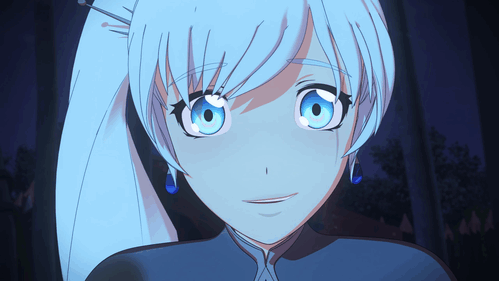
The stages of animus, when they exist, are loosely defined (as in Jung himself didn't actually say this, but is often attributed as having said it) as:
Tarzan: physical power
Byron: man of action or romance
Lloyd George: man as a professor or orator
Hermes/Mercury: man as a spiritual guide
If we look at this through the lens of Weiss's arc, we do see traces of these. The physical power Weiss is attracted to is embodied in Winter and Pyrrha. I mean Weiss specifically calls out Pyrrha's physical strength when she meets her:
Weiss: So, Pyrrha, have you given any thought to whose team you'd like to be on? I'm sure everyone must be eager to unite with such a strong, well-known individual such as yourself!
Weiss: This will be perfect! The smartest girl in class combined with the strongest girl in class! Together we will be unstoppable! I can see it now! We'll be popular! We'll be celebrities! We'll get perfect grades! Nothing can come between us now!
The man of action/romance is embodied in the Rusted Knight persona, and in Neptune, who is notably a giant flirt.
As a professor or orator, I would actually say there are many here. Klein, of course, reminding her who she is. Then there is Robyn, who is probably the most obvious orator in the story. Also Ironwood. Basically, thanks to Robyn having the election stolen from her, Weiss helps take down her dad. As a result, her mother returns to her (the feminine returning) and she is able to get Whitley to help save them all (integrating the masculine).
We also see a little bit of this later on with Jaune, in that Weiss expressly says she admires his maturity.
The technique of coming to terms with the animus is the same in principle as in the case of the anima; only here the woman must learn to criticize and hold her opinions at a distance; not in order to repress them, but, by investigating their origins, to penetrate more deeply into the background, where she will then discover the primordial images, just as the man does in his dealings with the anima.
We're not quite there with Hermes/Mercury, and I would bet that Jaune won't fully become gold or a spiritual guide unless he, well, has something to do with saving Mercury Black. The allusion is too literal not to be used.
Weiss as Knight
Weiss has always been a knight in addition to being Snow White, a maiden princess. Weiss defeats a knight-like creature (Arma Gigas) in the White trailer, and then goes on to be able to summon Arma Gigas as part of her semblance thereafter.
She's exceptionally talented in combat. In fact, the person Jaune calls to save Pyrrha when she's gone to fight Cinder is Weiss. He begs her to save Pyrrha, and Weiss promises him she will.
Sadly, just like Jaune in his attempts to be a knight, she can't, but not for lack of trying.
Later, in Volume 5, we see Weiss receive a power up that comes from her soul (another word for anima). The knight imagery becomes even more part of her semblance, as @aspoonofsugar has written. Notably, she summons Queen Lancer (literally referring to both the maiden-princess and knight archetype) after Jaune heals her in Volume 5. In other words, it's part of her integration with Jaune.

Then, Volume 8 happens, and Jaune again tries to rely on Weiss. He insists to Penny that "Weiss will buy us time" to heal Penny. And she would have tried (and probably died). But Penny tells Jaune that he's the one she needs to do something brave. It's his time to be a knight.
Weiss similarly expresses confidence that Jaune would have done the best he could after she arrives at the Ever After, unaware that he's fallen, too. Even as they go through the Ever After, Weiss affirms her Logos: herself, which is defined by her heroism and her failures.
Weiss: I don't know who you think you are, but let me tell you who I am. I am the granddaughter of a hero and the child of a villain. I am a citizen of a fallen kingdom and an heir to nothing. I will not be defined by my name because I will b e the one to define it. I am Weiss Schnee, and I am a Huntress.
And then we have the finale of Volume 9. Here, Weiss is the one to give Jaune words of wisdom, to encourage him after the Paper Pleasers return as jewels and Jaune realizes that he was not only holding them back, but holding himself back (literally, Jaune, despite being older, has not grown at all emotionally; he's stagnated. He's not a 40 year old in a teen's body; he was a teen in a 40 year old's body). Weiss tells Jaune what she told her younger self:
Jaune: I wanted the rush of rescuing someone, and I got that here.
Weiss: I think you're asking too much of yourself. We've been telling ourselves that failing means we're no good. But I can guarantee even the best Huntsmen in history? They've all lost. But they were still incredibly brave. And good.
In response to this, Jaune starts to cry (a traditionally feminine trait!), and Weiss asserts again what her Logos is: being a knight and a maiden, being brave and good, even when that means you can't save everyone.
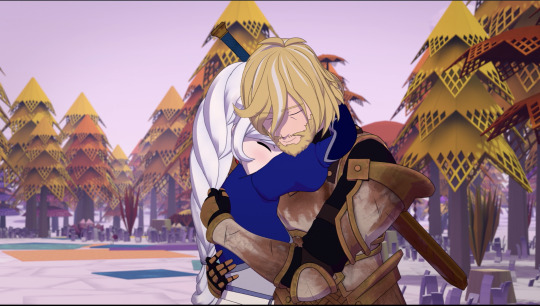
So then they fight together, again.
But it's another reversal. The princess, instead of being saved by the knight, almost kills the knight with fire in a scene that comments on what happened with Pyrrha, Jaune saving Weiss, and Penny.
Integration of Knight and Maiden
What's interesting about the Pyrrha-anima-animus connection is that it is Weiss who introduces Jaune to Pyrrha in the first place. Weiss wants to be Pyrrha's partner, actually. She deeply admires Pyrrha, as shown as she says about her and Pyrrha in that first meeting:
Nothing can come between us now!
What immediately comes between them is Jaune. Literally.
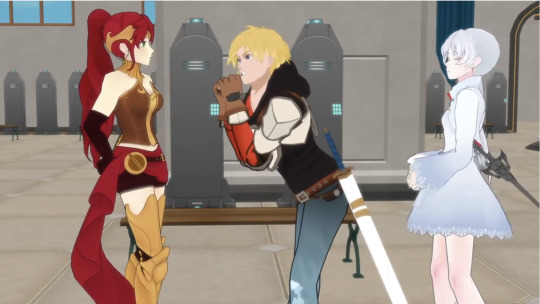
But it's not Jaune coming between them in an icky two girls can't get along because of a boy love triangle way. No, instead it's the three of them united because of their relationships with each other.
In that same scene, the very first, we have Weiss literally asking Pyrrha to intervene and get Jaune away from her by throwing her spear... which she does. The symbolism of Weiss asking Pyrrha to throw her spear into Jaune is uh. It's Freudian. Let's leave it there.
In fact, Jaune's feelings for Pyrrha start to develop as a result of her training him physically and encouraging him about his crush on Weiss. Hence, Weiss has been a part of Jaune and Pyrrha's relationship since the start of it; all three of them have an inextricably intertwined relationship.
Then, when Pyrrha says goodbye to Jaune and kisses him, it's right before shoving Jaune into a locker, the same as the ones she met him in front of. This time, when Jaune's in trouble, he calls Weiss--understanding that he needs someone else to save Pyrrha, and trusting that Weiss can do it. Jaune calls Weiss, because she's a knight. Unfortunately, she can't save her.
In Volume 5, Jaune saves Weiss precisely because his grief over Pyrrha contributes to Cinder impaling Weiss. Pyrrha is central to Weiss and Jaune's bond. Pyrrha and Weiss have always been intertwined as Jaune's anima, and if they do end up going with romantic White Knight, they would never have happened if it weren't for Arkos.
While I often see early-volume!Jaune's feelings for Weiss dismissed as shallow, I don't think they actually are. I think they're immature, sure, but look at what he tells Ren about Weiss:
It's Weiss... I'm completely head over heels for her, and she won't even give me a chance. She's cold, but she's also incredible. She's smart, and graceful, and talented-- I mean have you heard her sing? I just wish she take me seriously, y'know? I wish I could tell her how I feel without messing it all up.
Jaune clearly always did see the actual Weiss, not just her beauty, physical strength, or name. Yes, he was initially attracted to her persona, but the undercurrent was always real. Even Snow Angel.
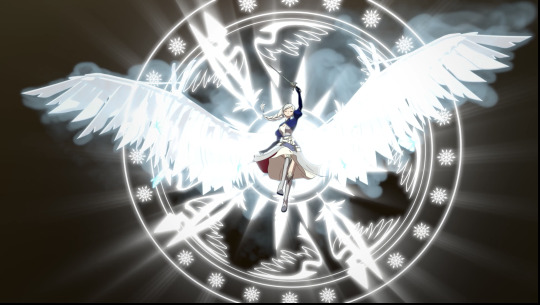
The problem is that Jaune could never be with Weiss if he remained in his Knight persona, expecting her to take the princess role. No, instead, they both have to be knight and princess.
Knight and maiden have never been more clearly integrated than in Volume 9's portrayal of Weiss and Jaune. Jaune is the legendary "Rusted Knight." But, he turns out to still be a Maiden literally waiting around a tower/house for rescue in the form of Team RWBY.

When the Jabberwalker comes, Jaune and Weiss fight together just like Bumbleby fight together; this is explicitly paralleled. (Also, Weiss kind of ignores her fighting partner, Ruby, which contributes to Ruby's feeling lonely; this isn't inherently wrong because they like, needed to stop the Jabberwalker, but it still, well, is, and is also emblematic of Ruby feeling left behind).
During this fight, Jaune tosses his sword to Weiss, who expertly wields it despite it being broken and then gives it back, therefore symbolizing that Weiss can be the knight, that she can be the masculine one, and letting her do so is actually not emasculating for Jaune. Instead, it's realization of his potential in being both knight and maiden.

(And, let's not get into the very very basic Freudian symbolism 101 of a woman using a man's sword.)
The Maiden, instead of being saved by the knight, almost kills the knight with a baptism of fire.

In fact, in Jung's own writing on the philosophical tree (yes, really), he notes this:
The lapis signifies the inner man... the natura abscondita which the alchemists sought to set free. In this sense the Aurora consurgens says that through baptism by fire "man, who before was dead, is made a living soul."
...
The genuineness or in-corruptibility of the stone is proved by the torment of fire and cannot be attained without it. This leitmotiv runs all through alchemy.
What is funny here is that Jung uses "lapis" here to mean the philosophical stone, which is most commonly called a ruby. But it can be a sapphire, or apparently a lapis lazuli. Go google the color lapis and tell me that that is not exactly Weiss's dress color.
Like Joan of Arc, Jaune is consumed by the fire. He is coagulated after the dissolution of the Paper Pleasers. But instead of coming forth as ashes, he comes forth as gold... with some growth still ahead and with some white streaks in his hair, symbolizing integration with the feminine (white=feminine in alchemy and Jung).
So where do Weiss and Jaune go from here? Jung provides a clue:
“Just as the anima becomes, through integration, the Eros of consciousness, so the animus becomes a Logos; and in the same way that the anima gives relationship and relatedness to a man’s consciousness, so the animus gives to a woman’s consciousness a capacity for reflection, deliberation and self-knowledge.”
C.W. Vol 9. Part II: Aion. The Syzygy: Anima and Animus
Both Jaune and Weiss have done this for one another thus far, and will continue doing so. Neither Weiss's nor Jaune's arcs are entirely over, either: Jaune still needs to fully embody the spiritual guide, and Weiss needs to embody wisdom and they are both so close but still have a bit more to grow.
#anima#animus#rwby meta#white knight#weiss schnee#jaune arc#pyrrha nikos#arkos#jung#alchemy#a bit#rwby#rwby volume 9
105 notes
·
View notes